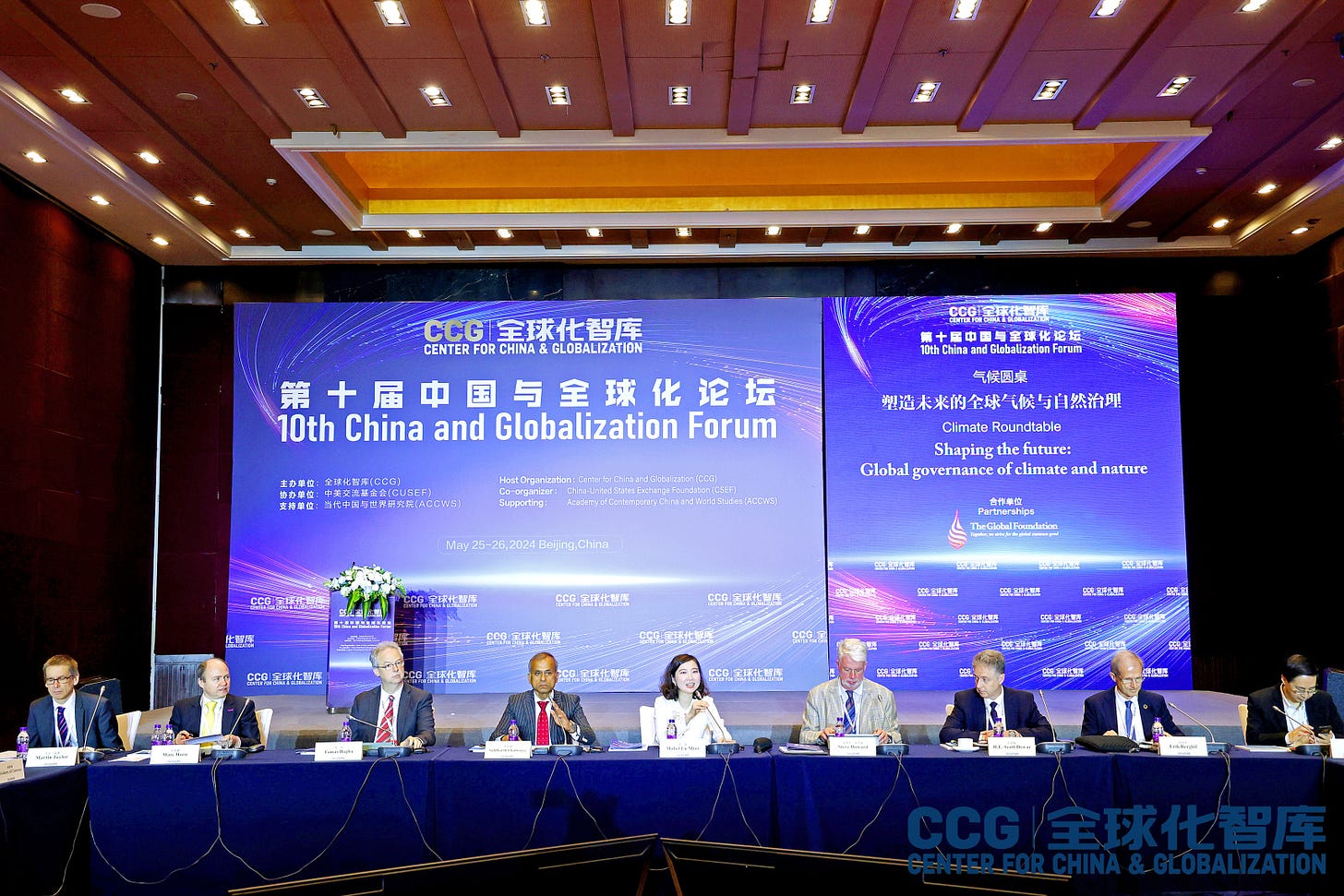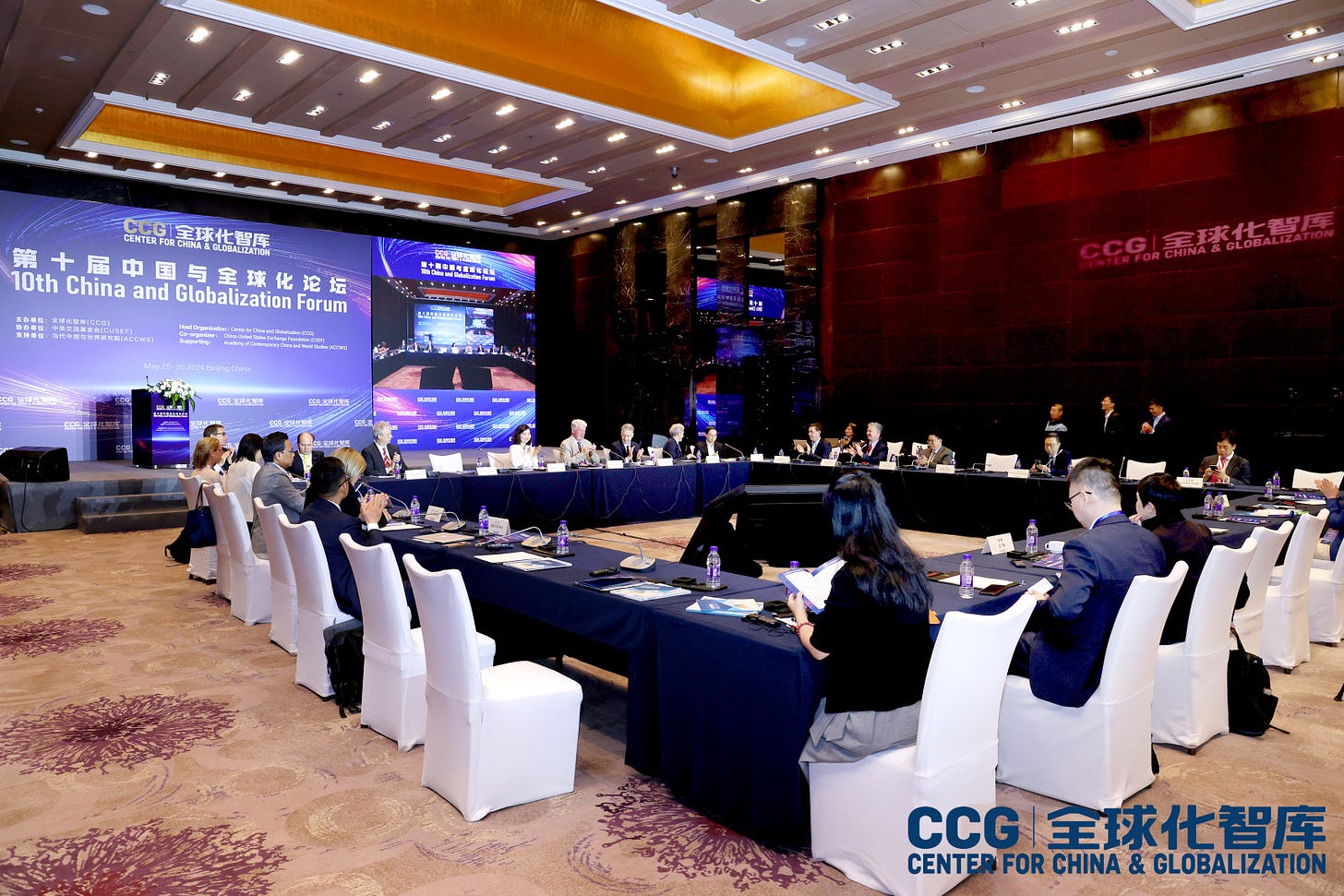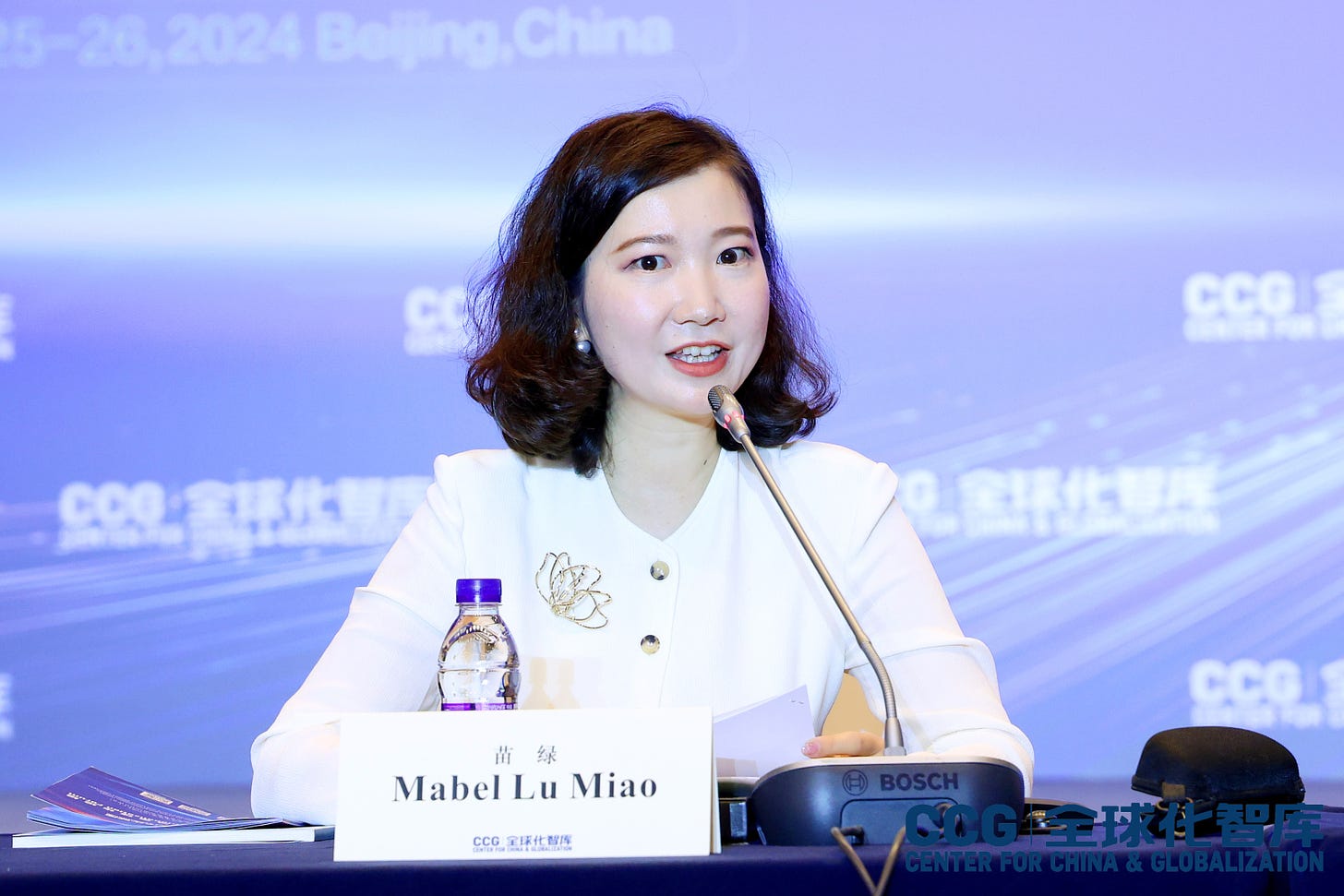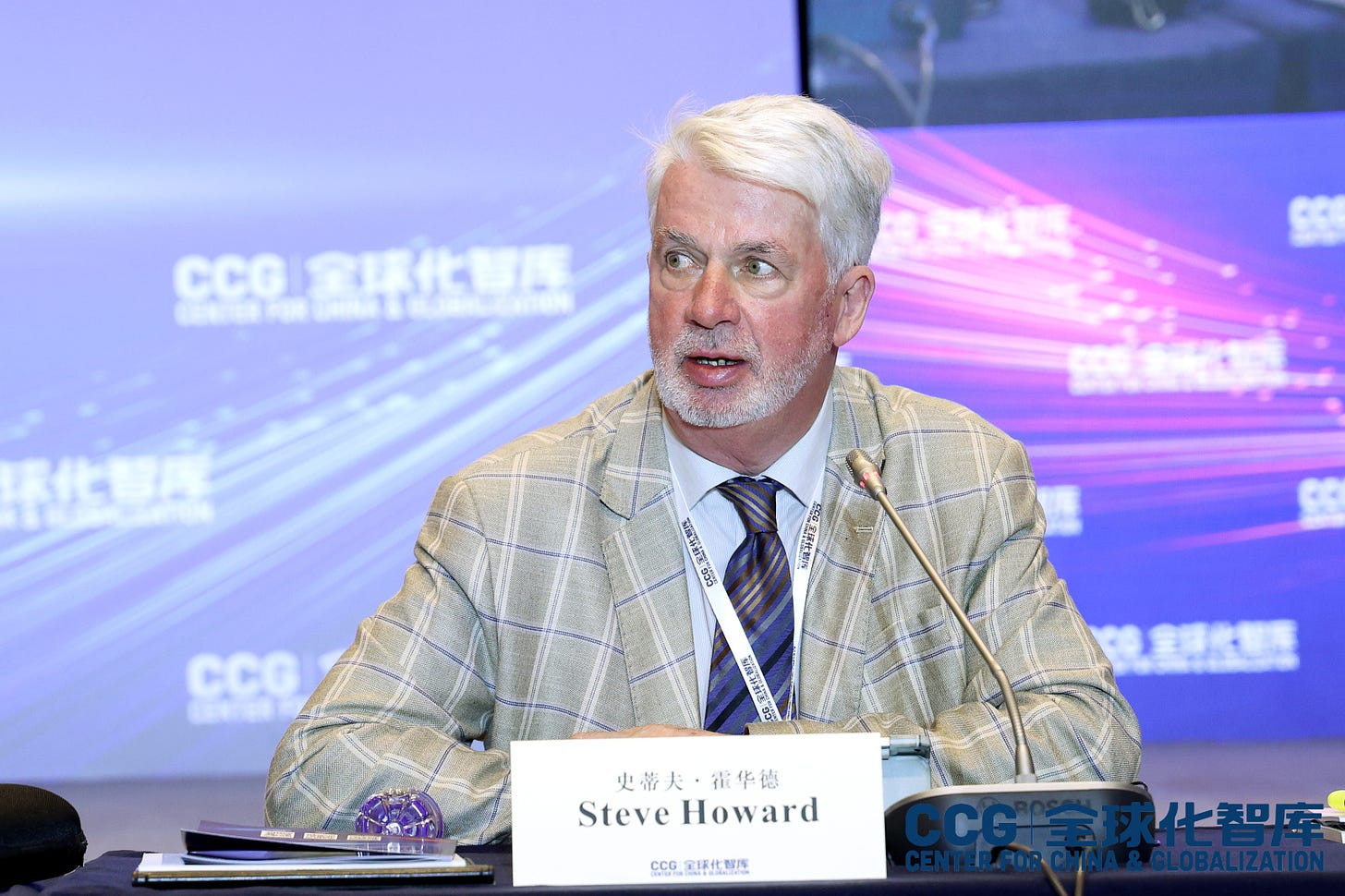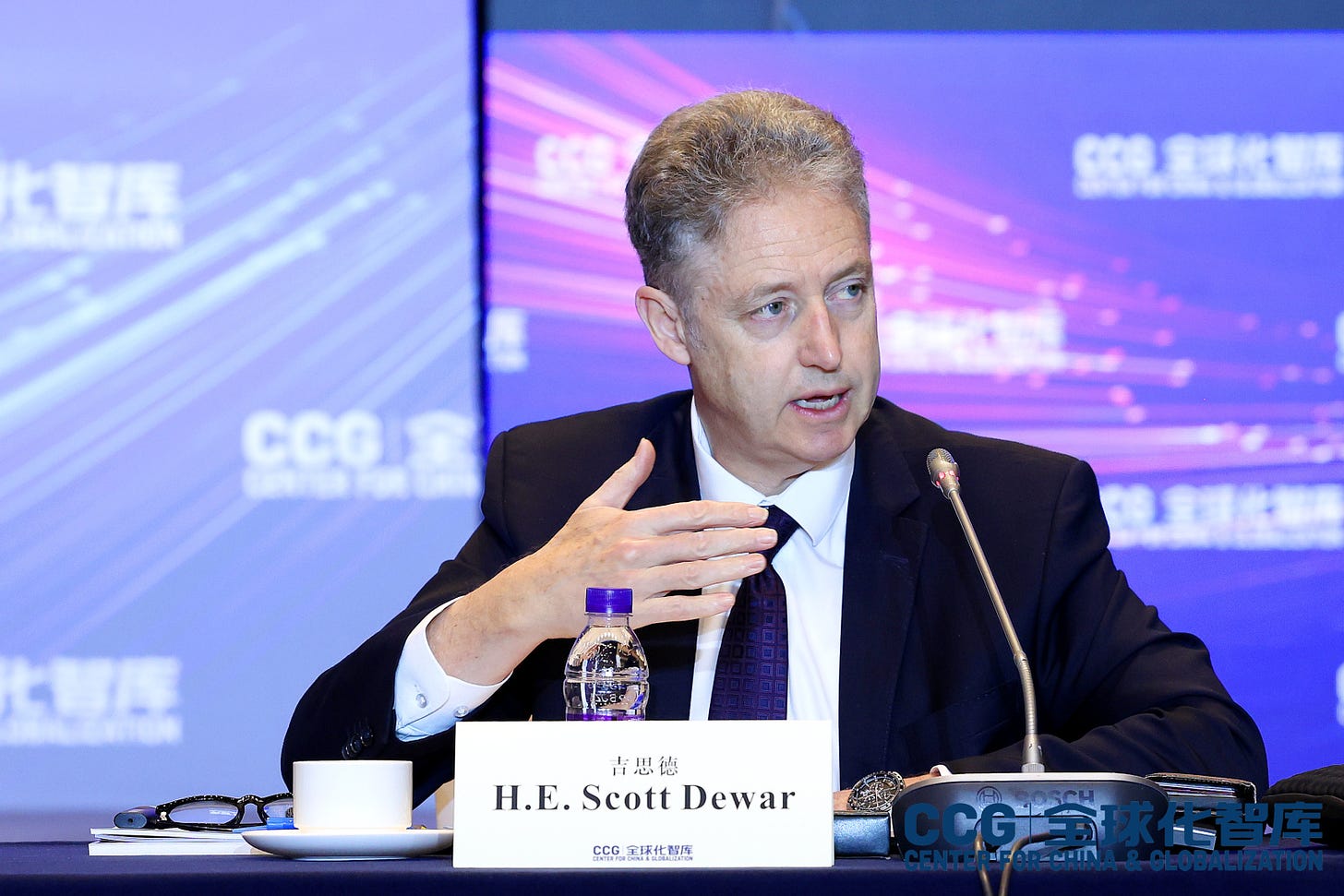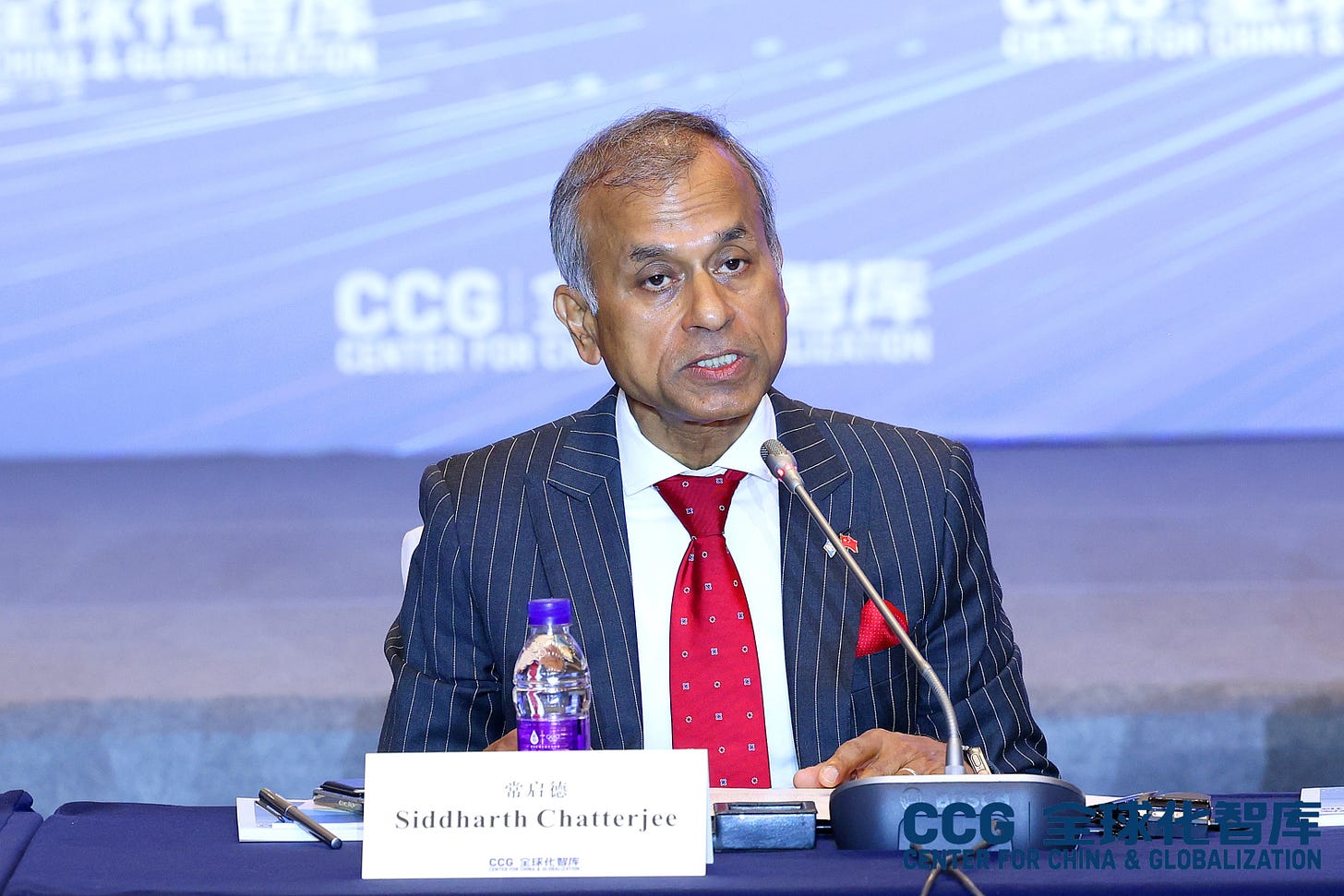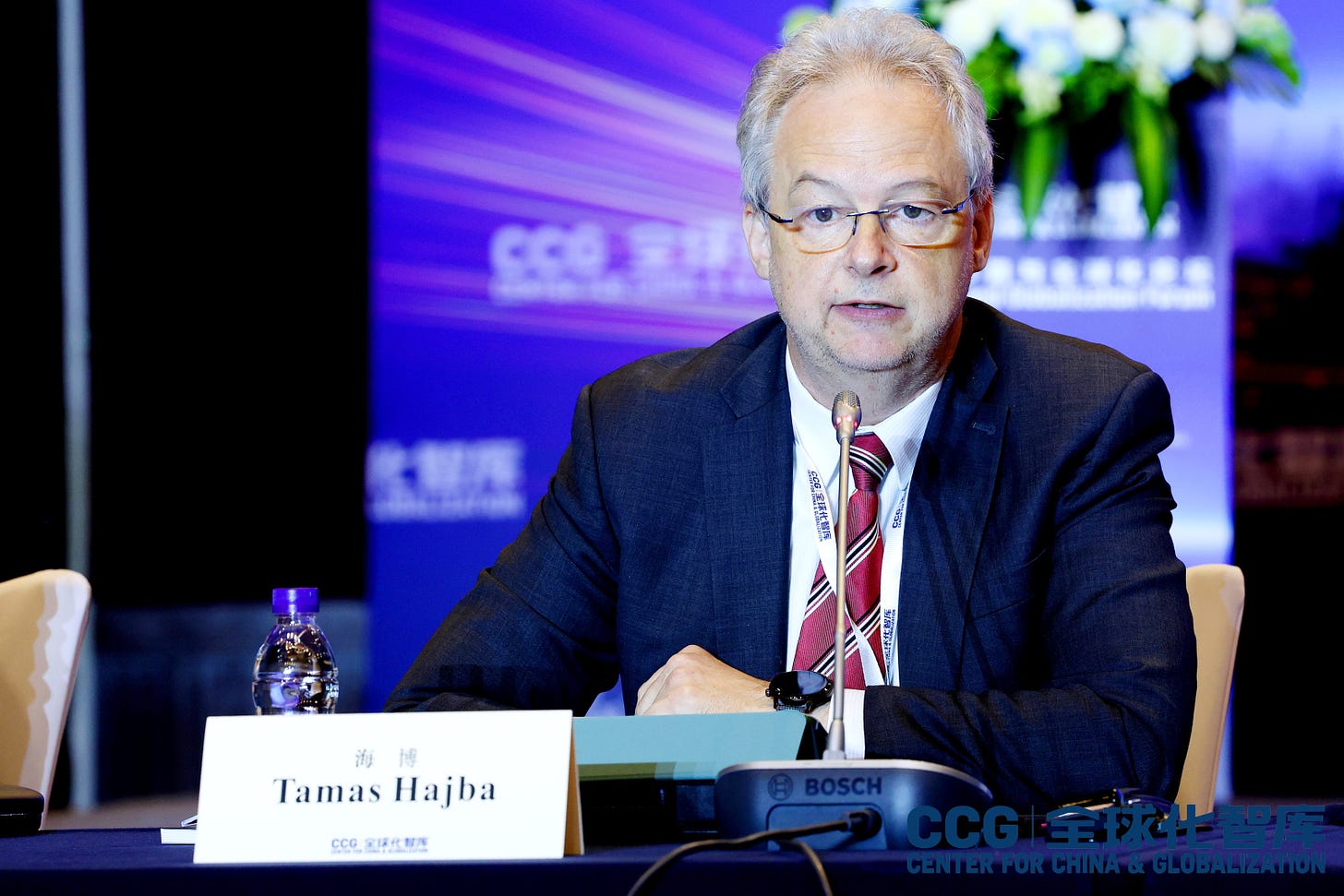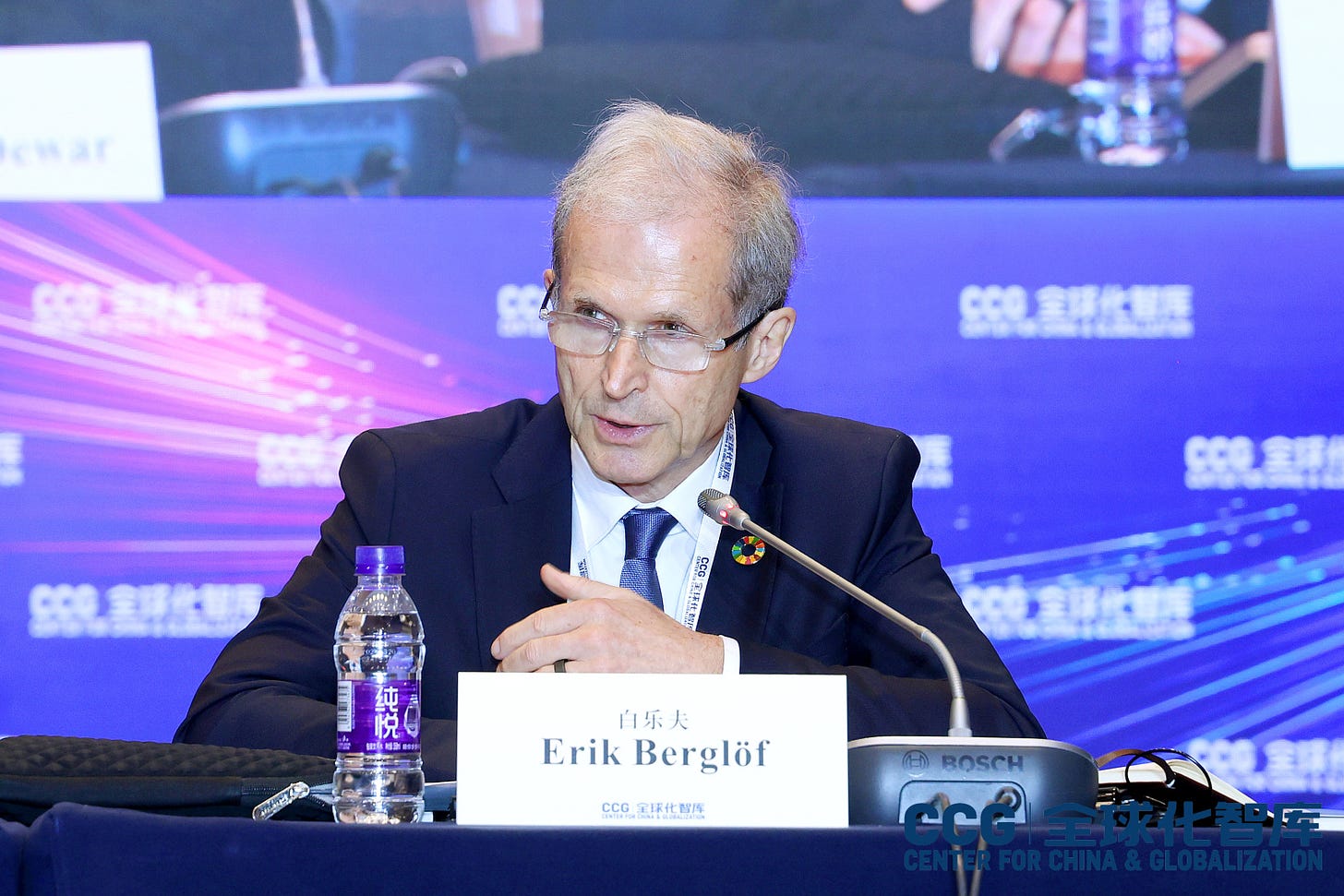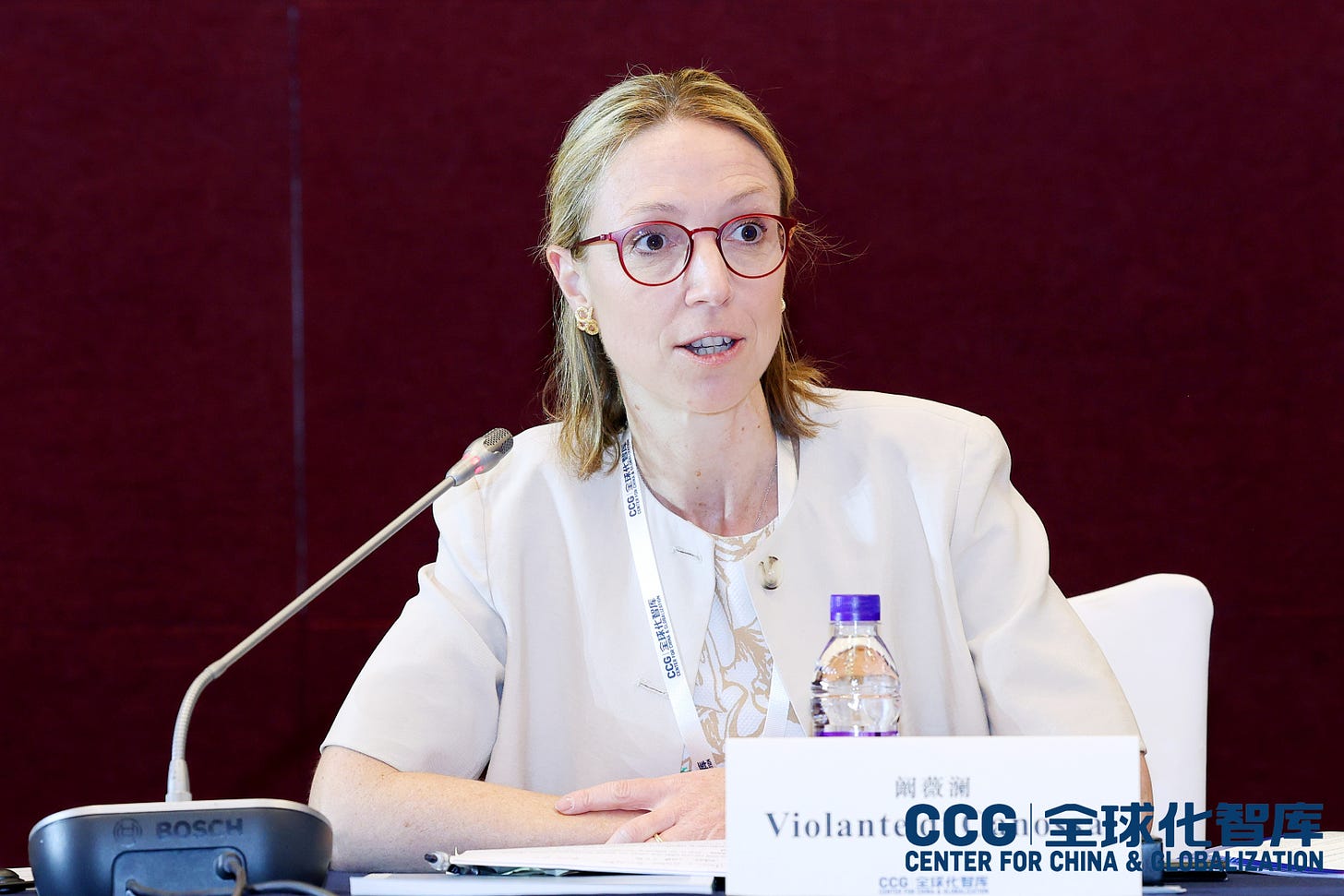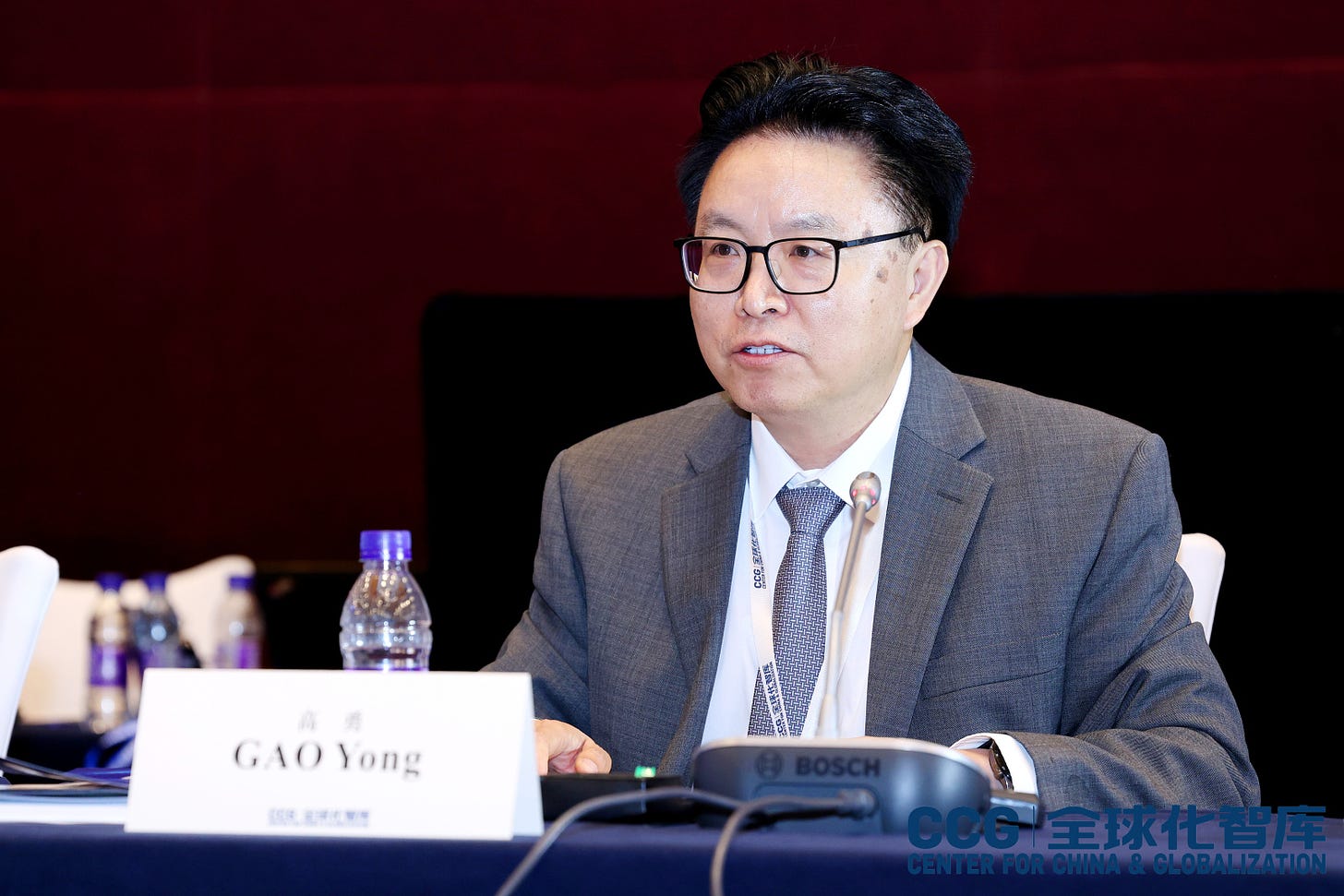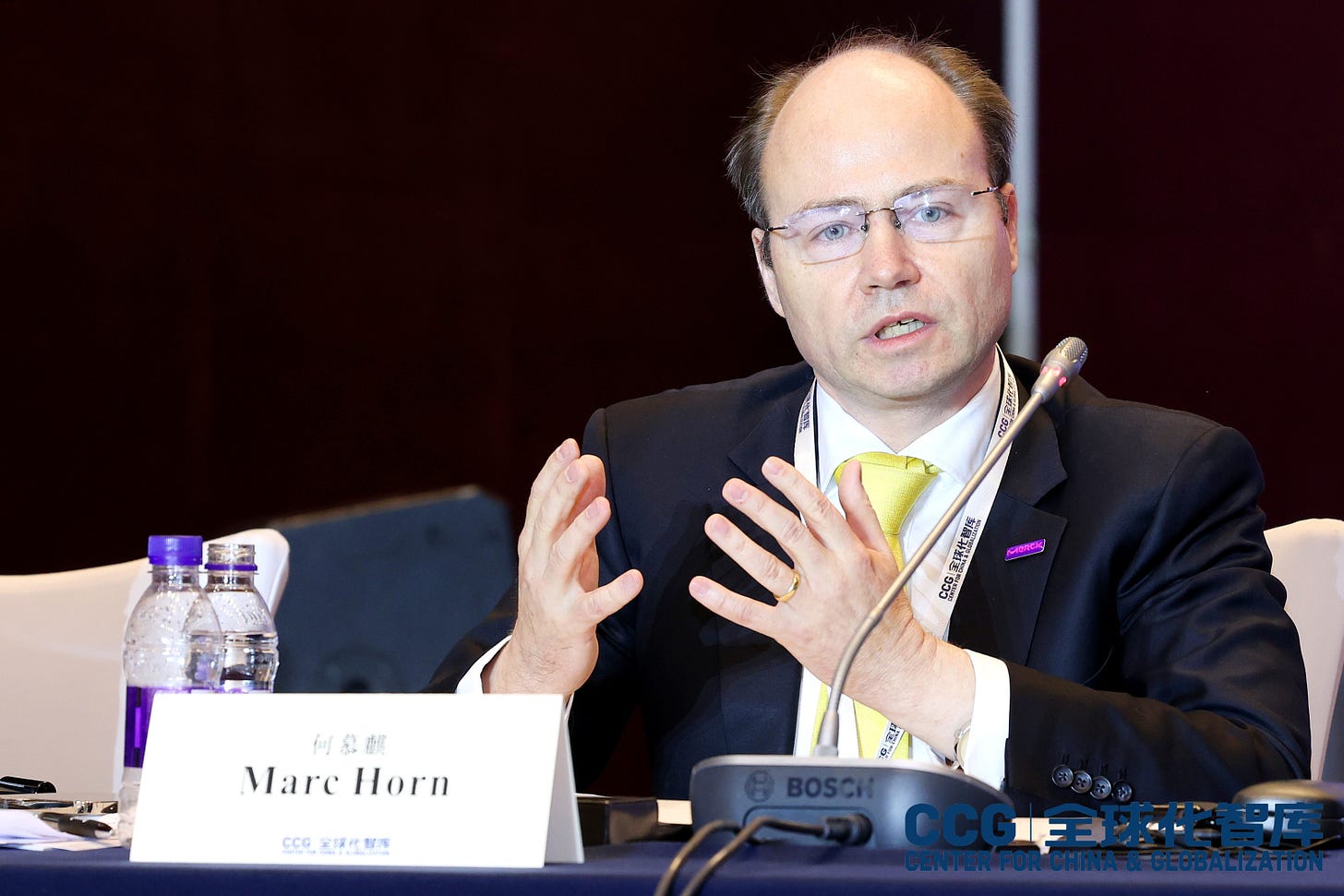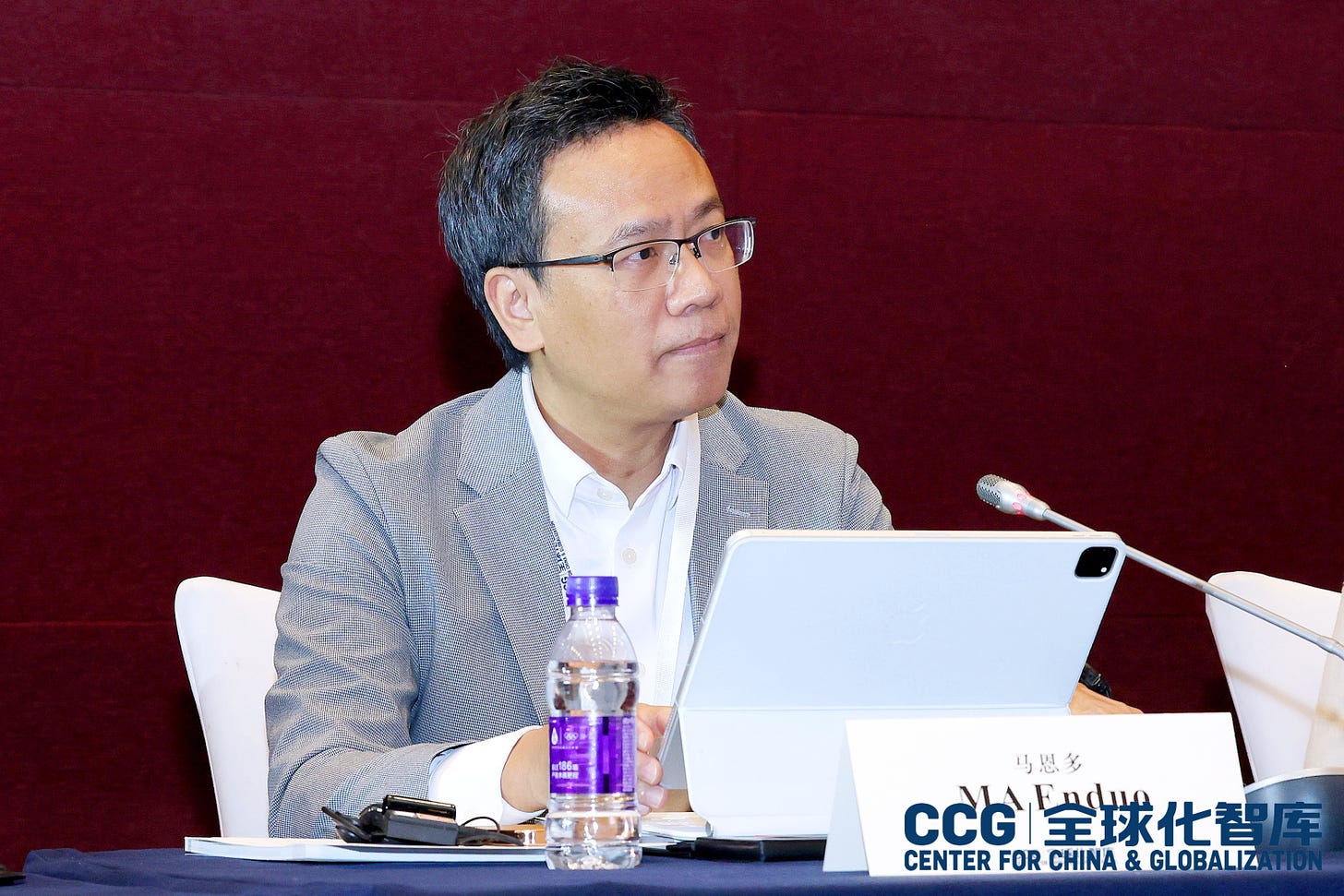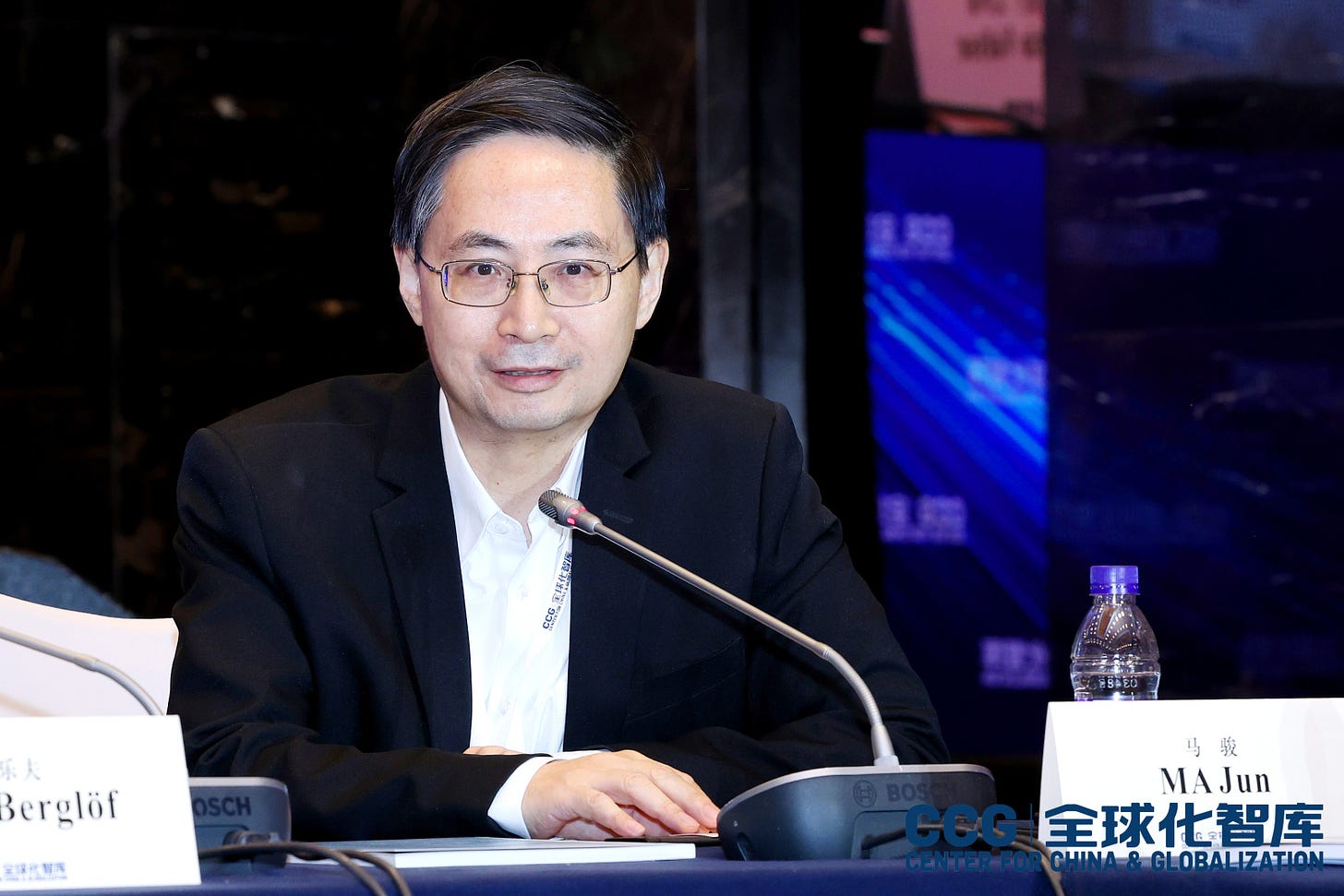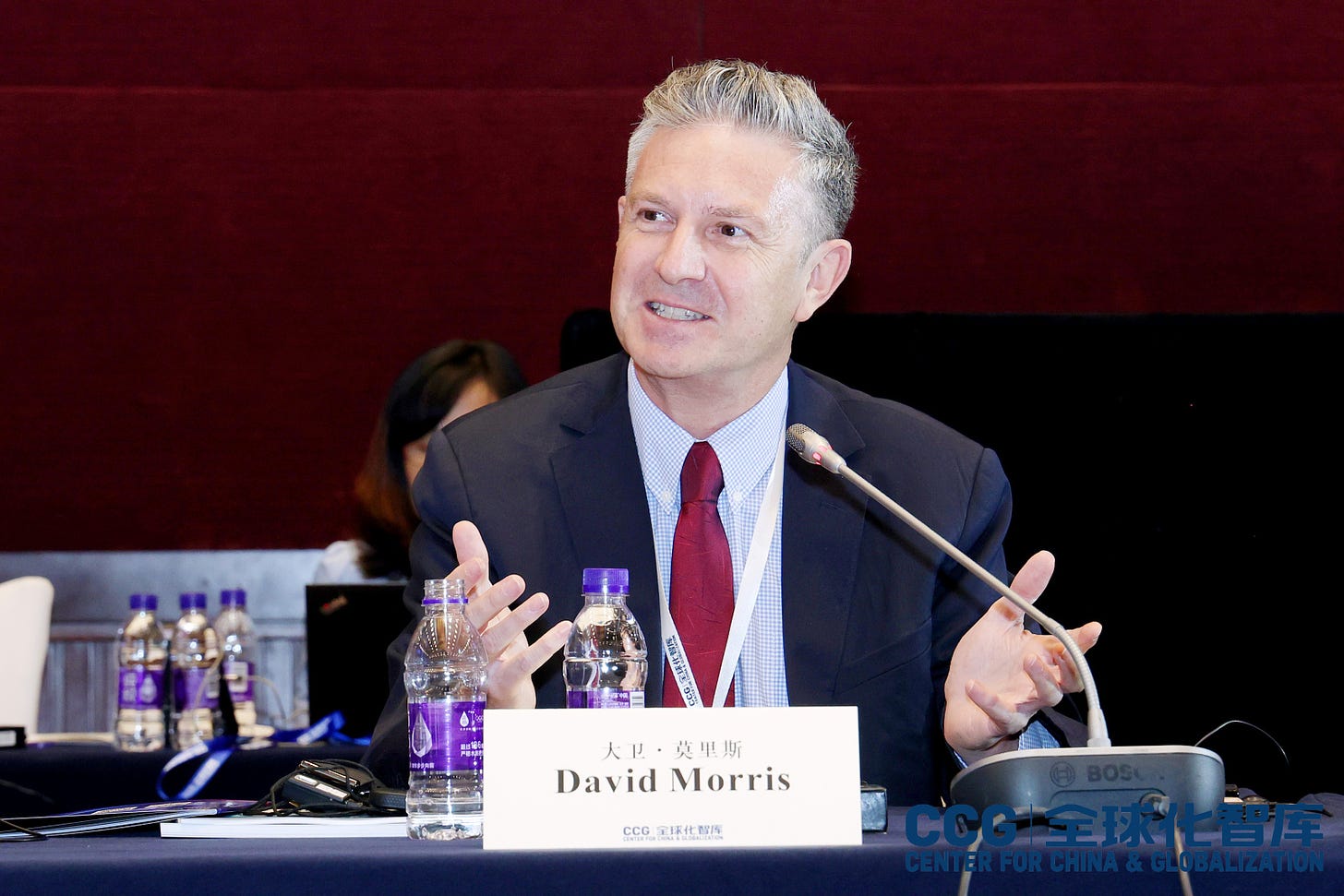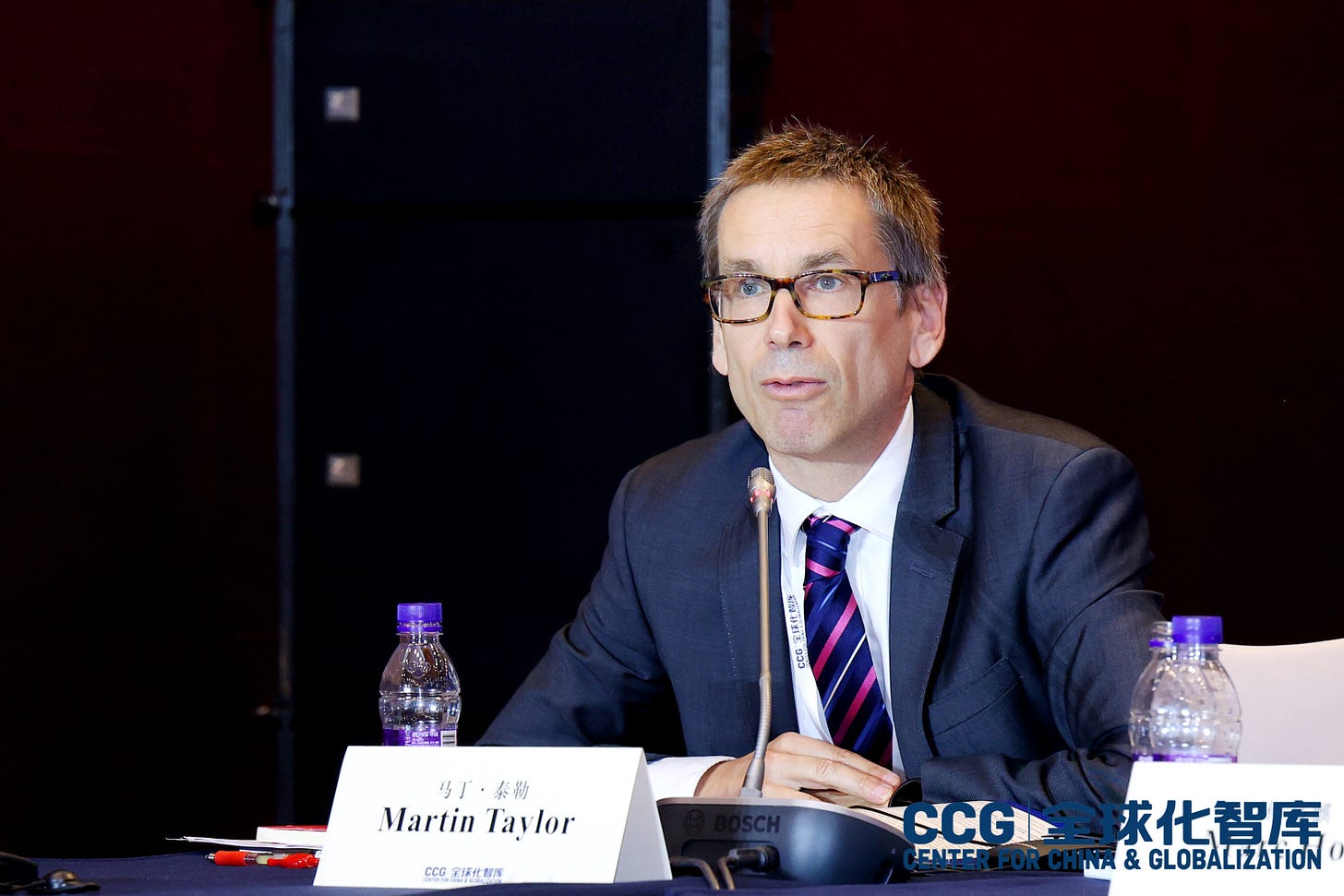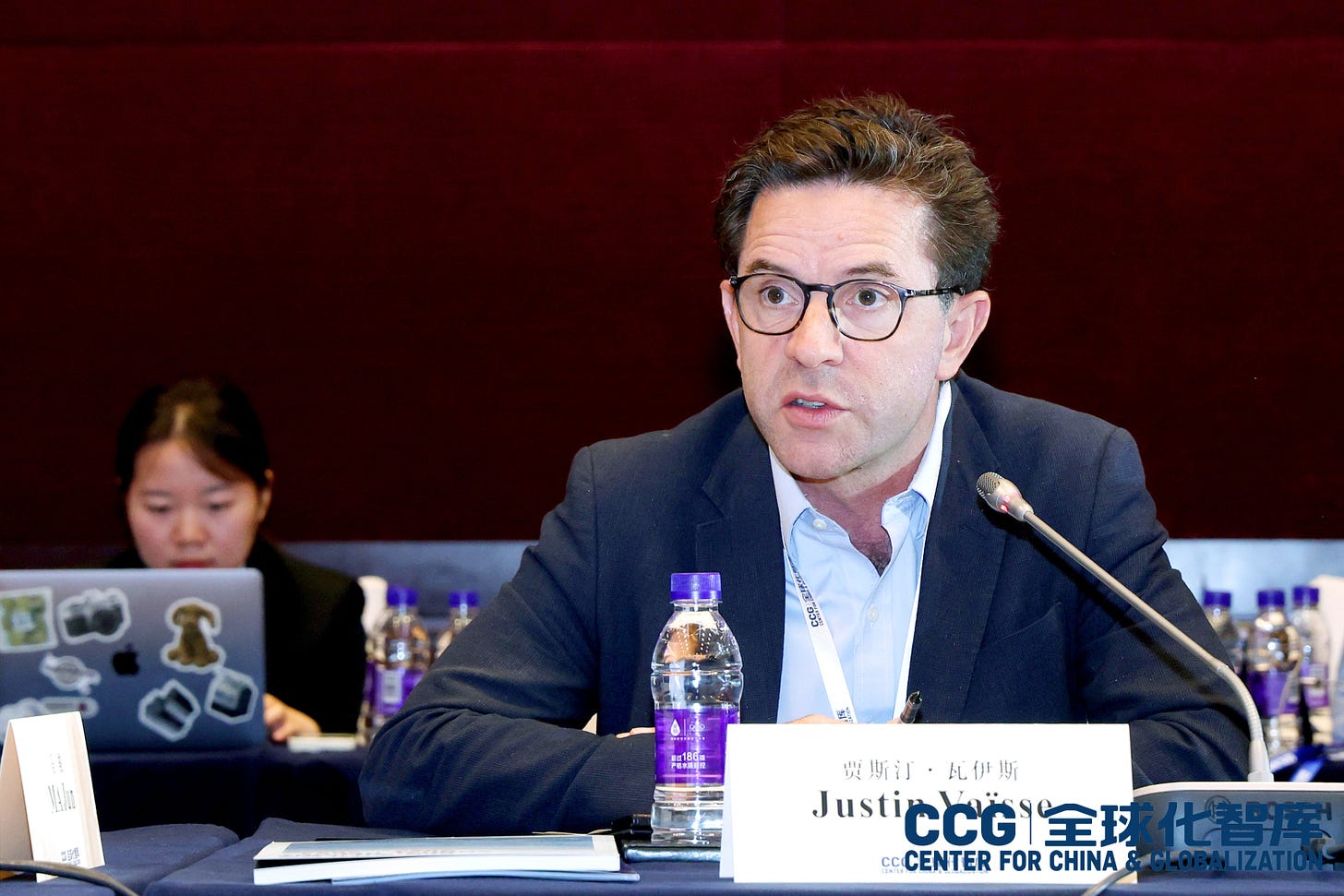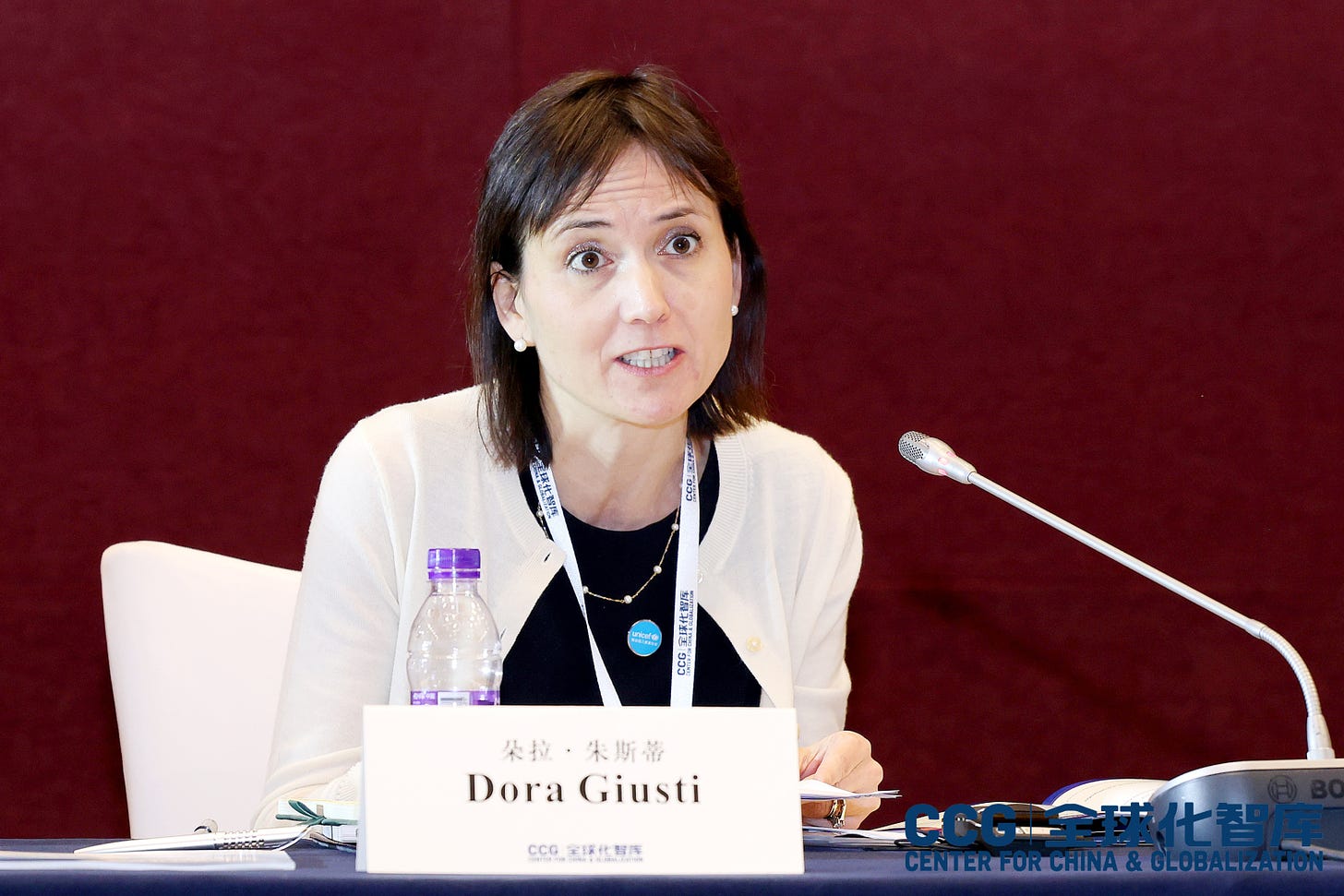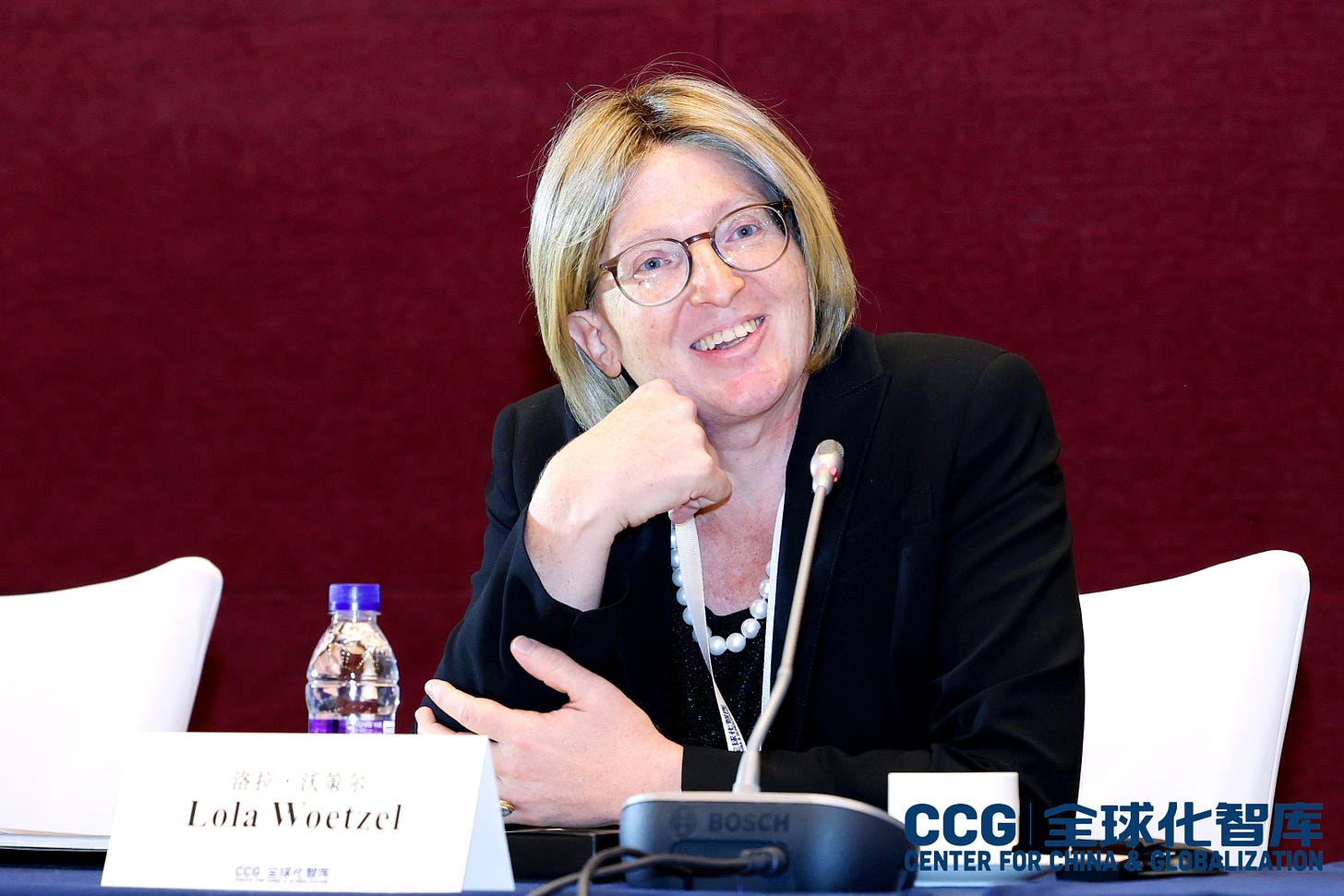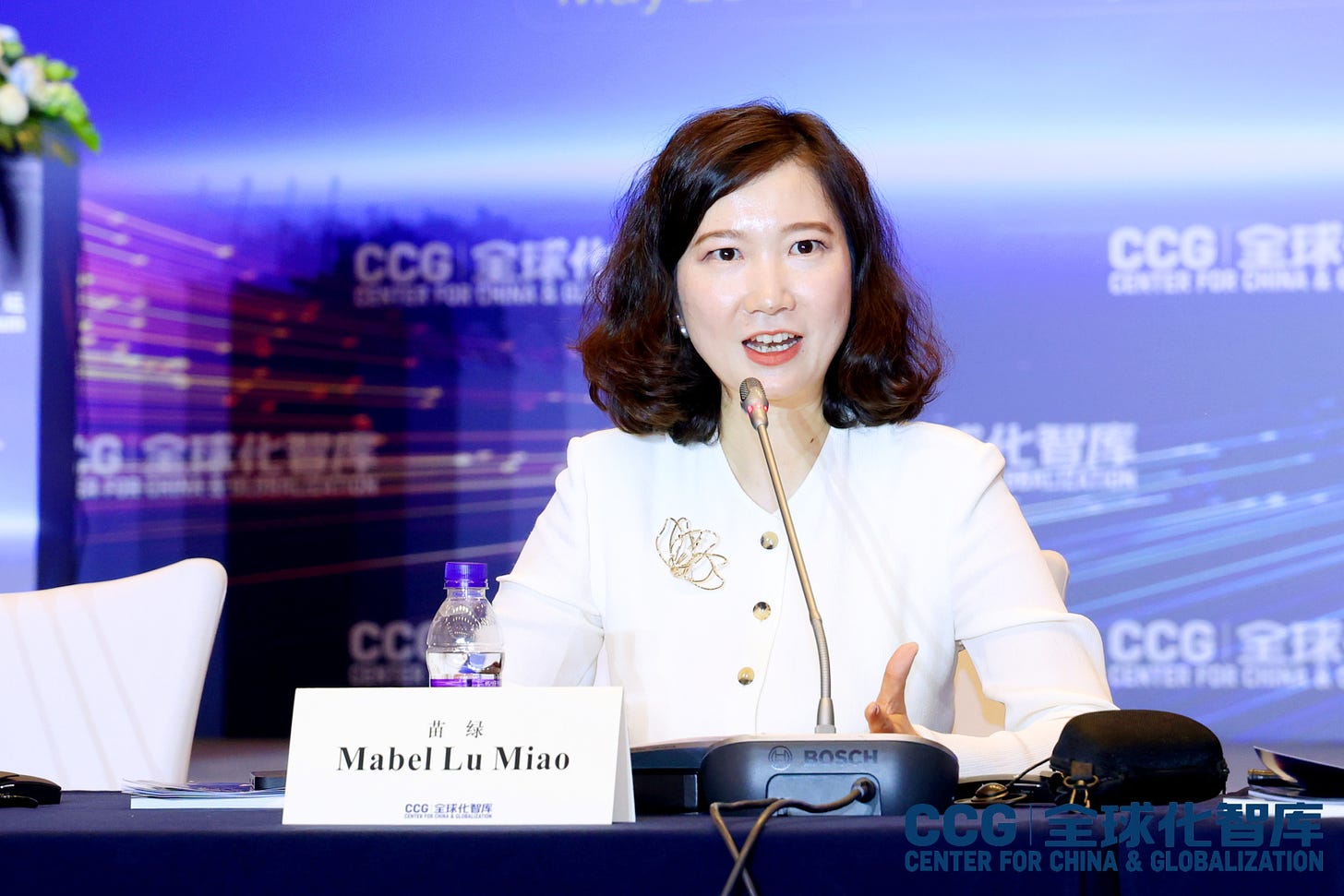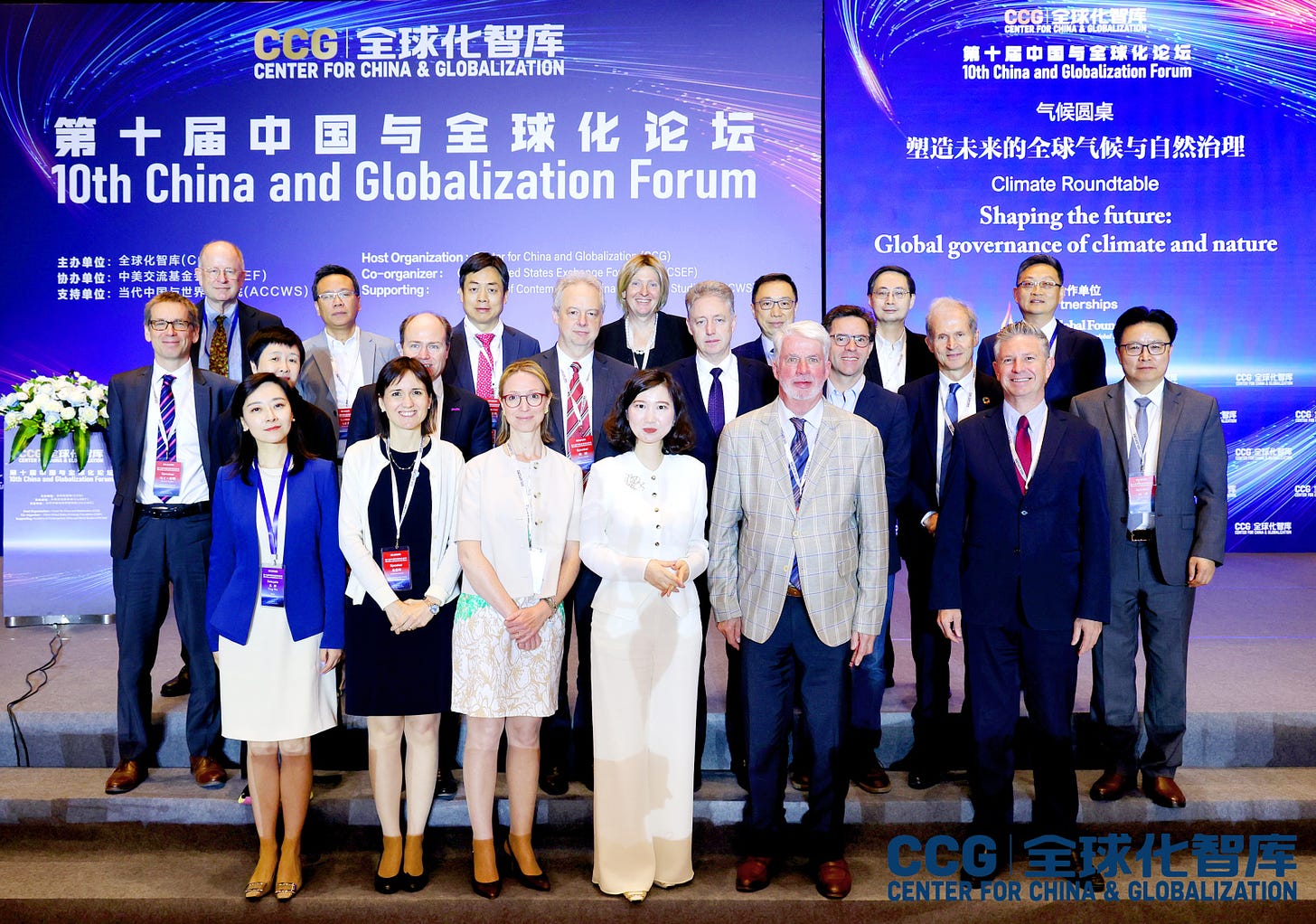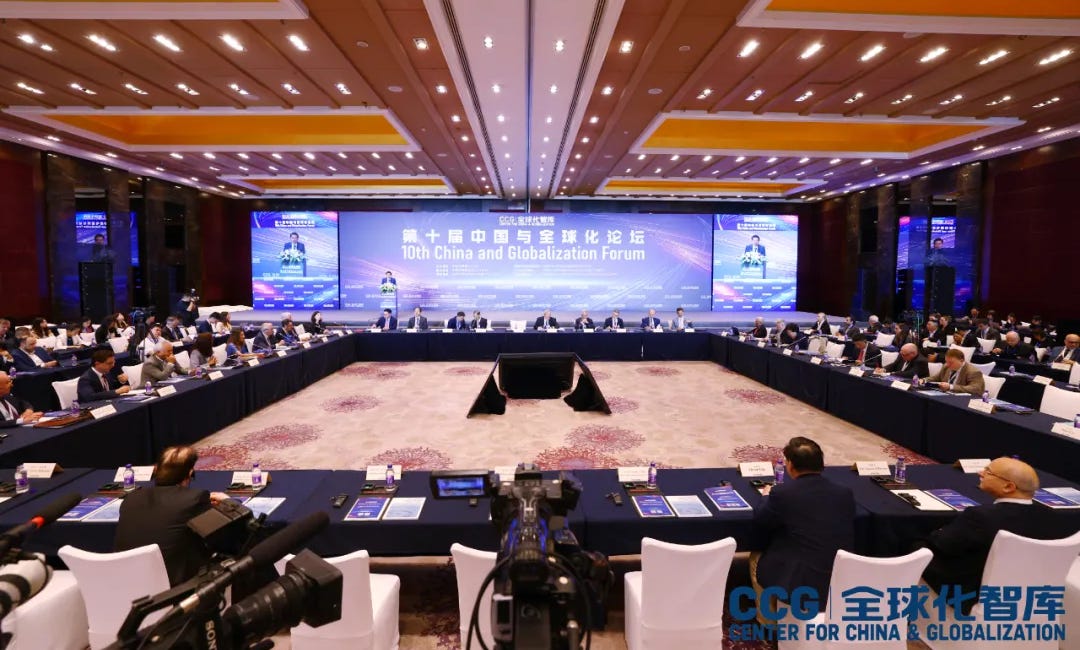Transcript of climate roundtable at 10th China and Globalization Forum
CCG and the Global Foundation hosted a discussion on the global climate investment deficit, featuring the Australian Ambassador and UN Coordinator, among others.
On May 25th and 26th, 2024, the 10th China and Globalization Forum, hosted by the Center for China and Globalization (CCG), co-organized by the China-United States Exchange Foundation (CUSEF), and supported by the Academy of Contemporary China and World Studies (ACCWS), was held in Beijing.
The forum has attracted coverage from domestic media outlets such as China Daily, CGTN, China.com, Economic Daily, Beijing Daily, and 21st Century Business Herald. CCG has also broadcasted video recordings of the open-door sessions via social media platforms in China, including Weibo, Baidu, Kuaishou, Douyin, Caijing, and WeChat.
Below is the full transcript of the roundtable from the event "Shaping the future: Global governance of climate and nature." CCG has published its video recording on Chinese social media, where it remains accessible. The video recording has also been posted on CCG's YouTube channel.
The roundtable was moderated by Steve Howard, Secretary-General, Global Foundation.
The speakers are, by order of appearance,
Mabel Lu Miao, Secretary-General, CCG; Member, Chinese People's Political Consultative Conference (CPPCC) Beijing Committee
Scott Dewar, Ambassador of Australia to China
Siddharth Chatterjee, UN Resident Coordinator in China
Tamas Hajba, Senior Advisor for China and Head of the OECD Beijing Office
Erik Berglöf, Chief Economist, Asian Infrastructure Investment Bank(AIIB)
Violante Di Canossa, Chief Economist, UNDP China
GAO Yong, Vice President of Public Affairs and Sustainability, Bayer China
Marc Horn, President, Merck China
Amos Ma, CCG Senior Council Member; Chairman and General Manager, Shenzhen Amos Food Group
MA Jun, Chairman, Green Finance Committee, China Society for Finance and Banking; Founder and President, Institute of Finance and Sustainability
David Morris, Vice Chair, the United Nations Sustainable Business Network for Asia Pacific
Martin Taylor, WHO Representative to China
Justin Vaïsse, Founder and Director-General, Paris Peace Forum
Dora Giusti, Chief of Child Protection, UNICEF in China
Lola Woetzel, Director, McKinsey Global Institute
Mabel Lu Miao, Secretary-General, CCG; Member, Chinese People's Political Consultative Conference (CPPCC) Beijing Committee
Ladies and gentlemen,
Your Excellencies,
Good morning to the 10th China and Globalization Forum. We are moving to a very important topic about the climate. We know that the UN Summit of the Future is coming this September. Welcome Siddharth Chatterjee, the UN coordinator in China. Welcome the Ambassador from Australia. Thank you, Howard. You always have a great passion for the climate change issue. I am also on the board of the Global Foundation (which focuses) on this topic. We have invited very distinguished guests today, including representatives from the OECD, the AIIB, and distinguished scholars from universities. Later, we would like to listen to your great recommendations and proposals on this topic. Today, our topic is "Shaping the future: Global governance of climate and nature."
Actually, in my center, CCG, this is our 10th flagship conference. In the past few years, every year we set on the agenda climate change and global governance. Last year, we did a great job on the climate change cooperation. We invited the EU and U.S. ambassadors to China. We organized an event on the EU, U.S., and China, three-party cooperation on climate change. We also invited the Special Envoy on Climate Change of China to participate in it, including the current one, and representatives from MFA.
Today we also sit together to touch upon this very important topic. I think climate change has gone beyond a simple natural science issue, evolving into complex issues, involving economic sustainable development, political security, infrastructure construction, human health, and well-being, etc. So it's a very comprehensive one.
For think tanks, I would like to propose that through our event, we can have more comprehensive proposals, and maybe give some recommendations to the UN Summit of the Future. We also can propose something for the G20 and the international mechanisms. I have a basic idea that we know the major theme of the United Nations is to achieve peace and development. But in terms of peace, we know there are a lot of conflicts; in terms of development, I think climate change is a very critical part to talk about it and give our own recommendations.
So next, I would like to hand over the microphone to my dear friend, Steve Howard. This event is jointly initiated by CCG and the Global Foundation, which is a very well-known and top think tank and foundation in Australia. I think Steve can move forward to the whole panel and introduce our distinguished panelists and chair this panel. Thank you, Steve.
Steve Howard, Secretary-General, Global Foundation
Thank you very much, Mabel, and welcome. Good morning to everybody, distinguished participants from quite an interesting cross-section of roles that you have, as Mabel said. And thank you, Mabel. You are a member of our steering committee for our project on Shaping Global Governance, Climate, and Nature, which will be formally launching in just a few weeks in Rome with our Global Rome Roundtable, where Mabel and Henry Wang will also be joining us for.
But it's very important that we're here in Beijing as a starting point. In many ways, we're going back in time to something that happened 16 years ago when the Global Foundation was able to host the Australian Prime Minister in Beijing for a meeting that also involved the newly appointed climate negotiator, a young man called Xie Zhenhua, who has served since with great distinction. That was the beginning of a very interesting partnership that was helpful around and with other nations in forming the early stages of climate change policy thinking.
I mentioned going back in time because time is actually the enemy that we face sbout addressing the issues around climate change and issues around nature. Let's not forget nature, which we'll hear about today.
While the Global Foundation is based in Australia, my office is in Melbourne. We are a kind of stateless organization, as I said at the opening yesterday. We work across the world and we have global members and contributors. So, I'm thrilled to be back in Beijing amongst old friends, and I'm thrilled to have global participants, for example, global institutions, the Australian Ambassador to China; we have the heads of global companies based in China, and we have a range of other prominent citizens, including, of course, some very famous Chinese contributors who I'm sure will hear from today. So quick background before we introduce it because we're running late.
The previous session was ambassadors' talking and you know what happens when you give ambassadors the microphone, with one exception, of course. Now it was a beautiful session to open this morning, but we apologize for being a little late, but it was beyond our control.
So, in February of this year, the Deputy Secretary-General of the United Nations, Ms. Amina Mohammed, addressed us online at our "State of the World" roundtable, where she talked about the state of global governance, from her perspective as No. 2 in the United Nations. She was very frank. It was an online public discussion. She really called for the help of networks of people and platforms such as ours and yours at CCG to play our part in helping to strengthen and improve global governance. We all know it's under threat. We've heard about that for the last day and a half in the conversations. There's a role that governments can play, but there might also be helpful roles for those in civil society, think tanks, institutions, and in particular in our case, the role of business with purpose playing a leadership role.
So this is a very important moment today to share views about where we are at. Can we accelerate the process against the enemy, which is time, to do positive things on climate?
Our focus is on global governance improvement, but around finance and nature. Our view is that the private sector has a bigger role to play alongside the official sector and that some aspects of the current arrangements are not actually fit for purpose. So, we think the global financial system needs significant reform if we're going to mobilize the millions and trillions of dollars you need from the private sector alongside the government. Similarly, President Lula in Brazil has an ambition to create a major investment fund on a global scale that would work in private markets and investment markets and allow some of the proceeds to help save the forests of the Amazon and other tropical forests.
So, one of the drivers for us is to build fresh coalitions of people from different backgrounds, to accelerate the process based on goodwill, but particularly to mobilize and enthuse the private sector to play a leadership role.
Now, Mabel is a member of the steering committee we have. We have a rolling program. We're starting here in Beijing today and then officially in Rome in a few weeks. We hope to go on with a global program across the world where we are wanted, in Brazil, later on in India, in other parts of the world.
And why are we in China? Why are we doing this here today? Our history, as an organization, going back, as I mentioned, even before we hosted the Australian Prime Minister Rudd, is there can be no improvements in global governance and action on climate and nature without China centrally involved. That's the essence of it.
Without further ado, we have four special addresses to open up our roundtable discussion today. I will ask everybody, each speaker to please try to stick to time because we are running a little late. But then once we've heard from our four important speakers, we'll open the floor to hear from other speakers; you are listed in the program. And if there's still time, we'll ask others who are not listed officially if you would like to make a contribution.
So without further ado, I'd like to hand over to H.E., Scott Dewar, Australian Ambassador to China, who recently returned to China as ambassador, but he's an old friend of China who has served here previously in the Australian diplomatic service. Ambassador Scott Dewar, thank you.
Scott Dewar, Ambassador of Australia to China
Good morning, everyone. Thanks very much, Steve. I will make sure I speak under 5 minutes to prove that ambassadors can do what they're told as well. Can I just say thank you very much, Steve, to you and the Global Foundation and to you, Mabel, as well, of course, and the Center for China & Globalization. My predecessor, Ambassador Graham Fletcher, I know, I spent a lot of time with both organizations and was really pleased to be able to talk last year about the the Australia-China bilateral relationship.
Steve, you referred to Prime Minister Rudd's visit in 2008. Last year, we had a really important visit as well. Prime Minister Albanese visited Shanghai and Beijing and talked about stabilizing our relationship. We've made really good progress towards stabilizing that relationship. That's an important element for us because I want to talk a little bit about Australia and China in the context of climate and nature.
The first thing is—I know everyone in this room knows it, but just to get the Australian position on the table—we absolutely recognize the need for action to achieve net zero. Our Climate Change Minister at COP last year said that the world is different to back in 1992 and we need to be adjusting the way we do things in our ambition to make sure we can achieve those targets. And he also, really importantly, made the point that it's not just about commitments, pledges and policies; it's about actually delivering the changes that we need to do to make sure we can get to net zero. That's why China is key to this. We're not going to achieve action on climate change without China. And for Australia and China, that's really an important part of our relationship.
Of course, there's the resources side for Australia. That's a really important part of our relationship with China. But there's also the technology and the renewable energy, and we're all going to have to work together on that to make sure we can mobilize the resources we need to achieve net zero. Every country in the world is going to want to be part of that technological solution. Australia also wants to do that.
There are two key things we want to do. We want to become a renewable energy superpower. We've got a lot of land. We've got a lot of sun. We've got a lot of wind. We can be a renewable energy superpower in Australia. Secondly, we want to make sure that we're contributing to the global technological solution. So the Australian government announced a ”Future Made in Australia” policy that will have a huge element that's doing things like processing critical minerals in Australia, building batteries and PVs and other key bits of technology in Australia because that's how we're going to make a contribution. It can't just be leaving that up to others.
For the Pacific, I just want to touch on quickly as well. We're one of the members of the Pacific Islands Forum in Australia. So we take our relationship with the Pacific island countries incredibly seriously. We previously committed two billion dollars, and we're expected to deliver three billion dollars to the global goal of net zero in the Pacific in the years ahead because we know that these small island states will need cooperation, support, and assistance to get there. And we don't win unless we all win.
Just two last quick points for me. First of all, I know we always focus on climate, but I'm really pleased to see nature in part of the theme for this conference. We're hosting the Global Nature Positive Summit in Sydney in October of this year, and that's really an important idea of trying to get on the agenda this idea of what we should be doing: it shouldn't just be causing no harm, but should actually be causing a positive impact on nature. That's the sort of frame that we need to be thinking about.
My last point is, I just like to reflect on something Mabel said, which is we talk about the UN and of course, COP and all of those really important multilateral bodies, but a whole lot of other regional institutions and plurilateral institutions like the G20 also have a really important role to play here. We can't leave this up to one institution. We need to be using all of these international institutions to make sure that we can move forward on increasing our level of ambition and also delivering the policies that actually are going to make sure we can get to net zero because that's what this is all about. Thank you.
Steve Howard, Secretary-General, Global Foundation
Thank you very much, Ambassador Dewar. Not only did you stick to time, but you also made some very emphatic points of useful contributions to this discussion that Australia at the government level is really stepping up, which is encouraging for those of us who work around the world from Australia. It's encouraging to see your government now being so active. And it's also encouraging, should I say, to see the improvement, the stabilizing, and hopefully even the further growing of Australia-China relations after a period that was less appealing than we would have liked. So that's very positive. And I think you also mentioned the Global Nature Positive Summit later in this year in Australia which is a very important global contribution. As the Global Foundation, we'd love to see Australia playing a bigger role than just for itself and playing a role in global matters such as this. A positive role is very important.
The next speaker is the UN Resident Coordinator in China, Mr Siddharth Chatterjee. I think you'd like to be called Sid, informally. We are delighted to have you with us, Sid. As I mentioned earlier, we were honored to have Deputy Secretary-General Amina Mohammed address us in February at our State of the World meeting. And in Rome in a few weeks, another senior official of the United Nations will join us for our Global Rome Roundtable. But you're the man on the ground here in China. Let's hear from you, please. Mr Siddharth Chatterjee, UN Resident Coordinator.
Siddharth Chatterjee, UN Resident Coordinator in China
Thank you very much, Scott, as well as Mabel, for always hosting some of the most fascinating gatherings, which bring great intellectual enterprise to our conversations. Scott Dewar, the Ambassador of Australia to China, my colleagues round the table, excellencies, ladies and gentlemen. Today we gather to discuss the role of international cooperation in tackling the climate crisis and helping us make peace with nature.
We face a triple planetary crisis of climate change, of air pollution, and of biodiversity loss, and our choices now will have profound implications for future generations. The pathway to a net-zero and nature positive world is necessary for survival. And international cooperation sits at the center of our ability to realize this endeavor. The UN Secretary-General Antonio Guterres said, "Humanity has waged a war we can only lose: our war with nature."
Meanwhile, the Intergovernmental Panel on Climate Change(IPCC) has highlighted the grave consequences of exceeding a 1.5°C increase in global temperatures, from catastrophic weather events to detrimental impacts on biodiversity and ecosystems. We need meaningful cuts to carbon emissions in this decade and the achievement of net zero by the middle of this century. Meeting these targets requires adopting renewable energy, along with innovations in land use, carbon capture, and energy efficiency technologies, amongst others. For China's part, it has pledged to achieve a peak in carbon emissions before 2030 and carbon neutrality before 2060.
However, China and the world can go further, thanks to new advances, but only, only, if we work together. This includes solar and wind power, energy storage solutions, smart grids, electric vehicles, investments in early warning systems, climate-resilient infrastructure, and much more. In developing and deploying this technology, China has emerged undoubtedly as a global leader, but no single country can tackle climate change alone. Here, international cooperation and multilateralism are vital.
On resource sharing, different nations possess varying levels of technologies, advancements, as well as research capability and financial resources. By sharing resources, we can accelerate the development and deployment of these resources.
This is crucial in the context of common but differentiated responsibilities, a key component of global climate negotiations that recognizes that some countries have more responsibility to act given their level of development as well as historical emissions.
Harmonization of regulations and policies across countries can help ensure that efforts in one region are not offset by a lack of standards elsewhere. Developing national or regional carbon markets can help to support these efforts, as launched in Hong Kong in 2022, in setting limits and providing incentives for reducing emissions. Meanwhile, joint research and development can allow countries to pool expertise and funds and drive innovation.
We have already seen some fruits of international cooperation on climate and nature. The Paris Agreement was a landmark accord. It underscored the importance of collective action and provided a framework for countries to set and achieve these goals.
The same can be said of the Kunming-Montreal Global Biodiversity Framework. At the UN climate change conferences, we have seen consensus on the need to phase out fossil fuels and support developing countries through a Loss and Damage Fund.
Despite this, significant challenges remain.
On financing, new mechanisms such as green bonds and climate funds are essential to mobilize the necessary capital. Similarly, public-private partnerships can see us leveraging both of their strengths to drive large-scale investments.
On political will, sustaining global commitments to climate action requires strong leadership and prioritizes the public interest in long-term sustainability and short-term thinking.
At the same time, developing countries often face the brunt of climate impacts but have fewer resources to address them. Ensuring equitable access to new technologies and financing is crucial for global stability and limiting global temperature increase to no more than 1.5 °C.
To move forward, we must strengthen international cooperation through enhanced multilateralism. Communication channels must remain open and actively foster trust and global collaboration among nations. High-level climate summits such as the COP meetings or bilateral efforts seen by China and the United States can play a vital role. We hope to hear more about how we can cooperate better on climate and nature at the upcoming Summit of the Future this September.
Ladies and gentlemen, the world must take this crisis as an opportunity to work together in the face of our many divides for a common cause and safeguard our planet. I would just mention what Steve Howard talked about, time being an enemy. In fact, we humans say time passes by very quickly, and time says man passes by very quickly. Thank you very much.
Steve Howard, Secretary-General, Global Foundation
Thank you, Sid. That's great wisdom in that final comment. But I think also hearing about the work that is being done and the positive spirit with which people are working together, I must say, in your remarks to see the way in which the U.S. and China, in spite of many other disagreements, have been continuing to work together very closely on the climate challenge is a credit to both countries. And this is something to build upon.
Now I know you need to leave for other commitments, so we're gonna thank you in advance and look forward to being in touch. And I'll move on to our next speaker.
Tamas Hajba is the Senior Advisor for China and Head of the OECD Beijing Office. The OECD, we know well at the Global Foundation. We happen to have an Australian now as the Secretary-General of the OECD. But we also have Tamas here in Beijing, which is a very important role for the OECD and building its relationship with China. Tamas, over to you.
Tamas Hajba, Senior Advisor for China and Head of the OECD Beijing Office
Thank you very much, Steve. I'd like to thank CCG for this invitation to join today's event at your forum. But I would also like to thank Steve and the Global Foundation for the invitation to join the Beijing mission of the Foundation this time. So I'm also pleased to share a few observations on this critical topic, climate change.
Indeed, as it has been said in recent years, we have made significant strides in advancing global environmental agenda. The noteworthy achievements include the Kunming-Montreal Global Biodiversity Framework, the ongoing negotiations for the Global Plastics Treaty, the International Conference on Chemicals Management, and last but not least, of course, the COP28, which secured a historic consensus to transition away from fossil fuels and operationalized the Loss and Damage Funds.
Now building on these outcomes, we need to focus on swift and effective policy implementation. We should look at what governments have already done or achieved during the past few years. In this regard, I'd like to refer to the OECD's Climate Action Monitor and its Policies Measurement Framework, which tracks 75% of policy instruments mentioned by the IPCC in 50 countries, covering two-thirds of global greenhouse gas emissions. The latest edition of this Monitor shows that the growth rate of climate action slowed significantly in 2022; it dropped from an annual 10% increase between 2000 and 2021 to just 1% in 2022.
Now this slowdown resulted from a mix of geopolitical and macroeconomic shocks, also national circumstances. The energy crisis led governments to increase fossil fuels support and delay planned climate actions, such as carbon pricing increases and phasing out fossil fuel infrastructure. Financial constraints due to COVID-19 recovery expenditures and increased interest rates also limited investment in low-carbon technologies.
Despite these setbacks, the energy crisis also spurred some countries to adopt more ambitious targets for renewables and energy efficiency, mostly driven by concerns over energy security and fossil fuels reliance.
However, the overall balance across the 50 countries that we tracked in our Framework marked a notable departure from the previous upward trends. To meet the commitments that we made at the COP28, we must urgently address several challenges. I'd like to highlight only three of them that have been raised at some meetings at the OECD most recently.
First, decarbonizing the economy while fostering inclusive growth. Policymakers must ensure that mitigation policies support economic development and social inclusion to secure political and public backing for climate action.
Second, finance. It has also been mentioned involving finance ministries is crucial. It's crucial that these ministries are involved in designing mitigation strategies to ensure they are based on credible policy tools and accurate assessment of impacts on other priorities. Mobilizing public and private investment and supporting finance-focused international fora, such as the Coalition of Finance Ministers for Climate Action or the Just Energy Transition Partnerships (JEPTs) is essential, especially for developing countries with significant fiscal constraints.
Last but definitely not least, an enhanced international coordination.
In short, we need to work together better. Effective and inclusive transition requires global investment in green technologies and open and fair trade, to make these solutions accessible at lower costs, benefiting all countries. We must integrate different approaches into truly global action on climate change, ensuring each country has access to the best data and information about effective strategies. But this will help prevent emissions from being shifted to other parts of the world, which could result in higher overall emissions for the same economic output. By leveraging evidence through solution learning, open markets, and free trade, we can also minimize the costs of the ambitious climate transition we need to achieve together.
Now, exactly for those three reasons, the OECD has created the Inclusive Forum on Carbon Mitigation Approaches (IFCMA). The Inclusive Forum aims to systematically map and track carbon mitigation policies, estimate comparative effectiveness, and facilitate evidence-based decision-making, mutual learning, and inclusive multilateral dialogue.
This helps minimize negative cross-border spillover effects like carbon leakage or trade distortions, making the climate transition less costly. It also allows us to identify and seize positive cross-border spillover opportunities, ensuring all countries benefit from the latest innovations and cost savings.
Since its launch, the Inclusive Forum has made good progress, growing to 58 countries, including 14 G20 countries. China has been an active contributor to this process and we hope that at some point China will also consider to become a member of the Inclusive Forum.
We will continue to expand the Inclusive Forum membership to capture a full spectrum of approaches, experiences, and perspectives, aligning our work with our international efforts, particularly the UNFCCC. Pilot studies are helping develop methodologies to map policies and estimate their emission reduction impact. Further studies will draw on diverse knowledge, and support capacity development on technical issues.
Finally, our recent analysis on measuring the carbon intensity of sectors and products addresses the main challenges in calculating product level carbon intensity, including information collection and verification across supply chains. This work aims to prevent the proliferation of different standards, minimizing the costs as countries adopt mitigation policies based on these metrics.
With that, I'd like to thank, again, Steve, the Global Foundation, and CCG again for hosting this event. I'm looking forward to hearing from you about the potential collaboration on addressing these key challenges, triple planetary challenges going ahead.
Steve Howard, Secretary-General, Global Foundation
Thank you, Tamas. That was to me very interesting because data is critical. Start with facts, and work from that. And the OECD has an unmatched capability in this regard. So I'm pleased to learn that so much progress is being made and the ambition is even higher. And I'm very pleased to learn that China, among other nations, is already part of this process.
Just to mention before we move to your fourth speaker, some years ago, we had the opportunity of working with the previous Secretary-General of the OECD at the early stages of winning support for what was then called Base Erosion and Profit Shifting Project. It was international tax reform. And now we have an adoption worldwide that avoids people from avoiding tax in international business transactions. So the OECD is capable of playing this global role. And Tamas, that's very encouraging what you just told us this morning and we look forward to building upon that.
A fourth speaker at the opening special address is from Mr. Erik Berglöf, who's the chief economist of the Asian Infrastructure Investment Bank (AIIB), with which of course I have very happy personal memories and also the friendship of President Jin Liqun. I was a member of the first international advisory panel of the AIIB, and I think it's a sensational achievement by China in creating a new institution for the development assistance of the world. Erik is going to talk to us about the agenda, but I think he's going to mention, among other things, the recent paper on Nature as Infrastructure, which I think is a very interesting development. Erik, over to you.
Erik Berglöf, Chief Economist, Asian Infrastructure Investment Bank(AIIB)
Thank you, Steve. Thank you to you and to the Center for China and Globalization for inviting me. I am gonna bring some positive news, I think. You know, I've been involved in these multilateral development banks for 20 years or so, and I think this is the first time that I have seen real change, and it is driven very much by the need for climate action. So that's what I'm gonna focus on.
Everyone here has focused on the scale and the urgency of this challenge. We need to start reducing the carbon footprint before 2025 if you're going to keep the objectives of the Paris Agreement.
The countries that we focus on, the developing and emerging economies, were not part of creating this problem. Nevertheless, they will need to be part of this journey. It's estimated that we're gonna need $2.4 trillion every year—that's about four times what we have today to achieve these targets in these countries.
And of course, as Steve emphasized, this is not just about climate; it's also about nature. We just launched this report on Nature as Infrastructure, and it's really moving beyond the nature-positive approach. It's really trying to see how we can use the full potential of nature to deliver services to us. And particularly, it's gonna be very important what it can help deliver in terms of the fight against climate change, both in terms of mitigation and adaptation and building resilience.
So it's really a joint fight, as others have emphasized. And this fight will be won or lost in Asia. 50% of global greenhouse gas emissions are now in Asia. We need to make progress here. Also, there are really unique opportunities to invest in nature and manage nature here in Asia. So that combined fight is gonna be critical and how it goes in Asia.
The MDBs, the multilateral development banks, are going to be central to how we can make progress on this. It's about making them better, delivering more effectively; it's about making them bolder and willing to take more risks; and it's about making them bigger, getting more resources into the system.
And of course, ultimately, this is about bringing in the private sector because that's what MDBs are all about. They are about leveraging resources, mitigating risks, and mobilizing expertise. And it's really about repurposing this capacity of the MDBs to climate action. That is gonna be critical.
Just remind you that the challenge that we are facing is really the greatest challenge to state capacity in human history, particularly, of course, in those countries where it's in shorter supply. So we need to look at how we can combine different mechanisms of governance and, in individual countries, between the plan, the markets, financial governance, and industrial policy. All these needs to be focused now on achieving climate action. And there, I think it's also where we can work as a system supporting individual countries in their aspirations to fight climate change and biodiversity loss. So that's what we are trying to do.
These reforms of the MDB system are really going very far. It's about co-financing—investing together and recognizing each other standards. AIIB is today the largest co-financier of the World Bank and the largest co-financier of the Asian Development Bank. We are very much pushing this agenda. We need to start thinking of this as one balance sheet with slightly different ownership constellations, but it's really one balance sheet of the MDBs. We are doing asset exchanges to release trapped capital. We just did the first big exchange with the World Bank—one billion dollars. It released capacity for the World Bank. It allowed us to invest more in poorer countries. It's very important.
We are also thinking about how we can come together and work to finance more in local currency instead of building up huge debt in dollars, yen, and euros, what have you. We need to work in local currency to make sure of this, and we work together across the MDBs.
So let me finish on that AIIB is 8 years old. We have a very large paid-in capital, a hundred billion. We have a responsibility to make sure that its capital is used in the best way, and that there's no trapped equity. So we have set our focus on climate as a key objective. It's the No.1 corporate strategy objective. We want to achieve 50% climate finance by next year. We have already reached that target. We are now aiming to increase that and we hope by 2030, we'll have invested 50 billion. That's almost as much as all the MDBs have invested so far in the climate capital.
We want to be Paris-aligned. Since July of last year, every single project has to go through Paris Alignment. We launched the Climate Action Plan, we will complement that with a Nature Action Plan this year.
We very much want to look not only at each individual project but to contribute to climate. We are now for the first time doing a policy-based landing for climate. It's gonna be a critical, new tool for us to support the fight against climate change. Again, this fight has to be won in Asia, but it is really a global challenge. So thank you again for inviting me here.
Steve Howard, Secretary-General, Global Foundation
Thank you, Erik. They're impressive, but at the same time, they're daunting numbers when we think of the scale of the challenge required. But on the other hand, we face it with optimism, and it's great to see the AIIB playing a leading role in that ambition of 50 billion by 2030. And already, 50% of your financing is being climate finance is very encouraging indeed. So thank you.
We've now heard from our four opening special speakers. How interesting has that been, to hear from these views which are diverse but positive. And I think there is something cohesive coming through in the messages.
But now we're going to open the floor to other participants to hear from you. I will run through the alphabetical list as is the custom here at CCG. I'm gonna ask you to be, please remain brief in your remarks and to the point. And the first speaker will be Ms Violante Di Canossa, who's the Chief Economist with UNDP here in China. Violante?
Violante Di Canossa, Chief Economist, UNDP China
Thank you, Steve. Thank you very much for the invitation. Thank you, Mabel and CCG for having us here on this very important topic.
I totally agree with Erik and I would like to pick it up from there, the fact that Asia is a key player in climate governance and in climate action. It is indeed the most vulnerable region to climate change, but it is also the one with the most variety of countries and contexts. We go from China to the SIDS that have been mentioned just now.
China is a significant contributor to climate action, fostering green sectors, including renewable energy and immobility. At the same time, coal reliance in the country continues to pose significant risks to the environmental target of China and thus Asia and the world, including the 14th Five Year Plan targets as well as some of the other high-level pledges that have been put forward.
Against this context, I would like to make two points related to climate governance and how countries like China or international organizations like the one I'm representing, the United Nations Development Program, can contribute to moving forward and accelerating action.
The first one would be that given China's size and capacity, ambitious nationally determined contributions (NDCs), which are supposed to be submitted by 2025, would be an extremely powerful signal and would be critical to keeping the Paris Agreement alive and supporting China in achieving its environmental targets, high-quality development vision in alignment with the SDGs.
The second point is that at UNDP, we are working to support countries to design the next generation of NDCs. A critical innovation here would be to effectively go beyond pure climate focus—and this is something you touched upon and also other speakers today—incorporating biodiversity considerations, using biodiversity protection and nature-based solutions for climate mitigation adaptation, building a country's resilience to environmental shock.
In practice, bringing together climate and nature into an inclusive transition that leaves no one behind would turn climate action into a powerful systemic solution—again, something that was mentioned before. Addressing the three dimensions of sustainable development, which are economic, environmental, and social, brings everything under one system and one comprehensive approach. This is what UNDP is striving for and looking forward to collaborating and joining hands together with different stakeholders, both on the public side and the private sector side. Thank you.
Steve Howard, Secretary-General, Global Foundation
Thank you very much. That's very concise and in particular, encouraging China—because as China goes, so goes the world—in the whole matter, to have greater ambitions on the nationally determined contributions, but also the on an integrated approach that climate and nature cannot essentially be separated. In fact, as we heard from the previous speaker, nature can actually help solve the climate challenge. So we have to have a joined-up view. So thank you very much for that and for also the short time that you took.
GAO Yong, Vice President of Public Affairs and Sustainability, Bayer China
Thank you, Secretary Howard and Mabel, for your invitation. Bayer is a leader in life science committed to achieving carbon neutrality for all business operations by 2030 for Scope 1 and 2 emissions, and by 2050 for Scope 3. As a biologist, I approach today's topic with a perspective centered on stewardship of our planet.
This stewardship is crucial, not only for the myriad of biological species that call Earth home but also for the unique species, known as Homo Sapiens, mankind.
The challenge of climate change is intricately linked to the dramatic surge in human population over the last two centuries. Despite that Homo Sapiens has been around for 300,000 years, its population remained relatively small until recent history. The onset of the agricultural revolution around 10,000 BC saw the world's population at just a few million. It was the Industrial Revolution that catalyzed an unprecedented population boom, propelling it from a few hundred million in the 18th century to today over 8 billion.
The essence of human survival revolves around fulfilling basic needs, which is well encapsulated by the Chinese idiom "衣食住行 yishizhuxing", which translates to clothing, food, shelter, and transportation.
As a species of intelligence, humans have developed various rules and systems to govern activities and behaviors, aiming at meeting these needs for the largest number of individuals possible. Unfortunately, these activities have also led to significant greenhouse gas emissions.
So I think, to address this issue, it is imperative that we adjust our actions and behaviors in a manner that not only reduces emissions but also secures the basic needs of humankind. Achieving global carbon neutrality requires a concerted effort of international cooperation.
Historian Harari postulates that the ability to cooperate is a defining trait that sets Home Sapiens apart. This capacity for cooperation, he argues, is what has enabled humans to ascend to the apex of the food chain.
I think climate change poses a real-time test on the cooperation trait of Home Sapiens. Against the backdrop of a world that is becoming increasingly polarized and divided, can the 190-plus UN member states, especially the larger and wealthier ones, truly collaborate in the pursuit of carbon neutrality? 8 billion people are watching. Thank you.
Steve Howard, Secretary-General, Global Foundation
Thank you very much. It's an interesting take to hear from a corporate representative who's actually a scientist and takes a long trace of history. How will history judge us if we don't get this right is a very important question. Thank you, Mr. Gao Yong.
Next speaker, just before I introduce, we have six more identified speakers, but I'm hoping we'll have some time at the conclusion of their presentations to hear from others who are in the room if you wish to make a contribution. Also, maybe those who've spoken before will have a chance to make a few more brief remarks if they wish to.
So without further ado, we move from one great global corporation to another, and I'm very delighted to have such a strong presence from global industry in the room. So with that, Mr. Marc Horn, the president of Merck China.
Marc Horn, President, Merck China
Thanks a lot for having me. It's really a pleasure here and really encouraging to hear of a sense of urgency and importance around that topic, no matter whether you talk to an ambassadors' roundtable or you're talking in this forum here together. So happy to be here.
Just as a quick introduction. Merck is the oldest pharmaceutical chemical company in the world. We have more than 350 years. We are leading life science, healthcare, and electronics. We are family-owned and stock-listed at the same time.
For us, the sustainable development of individual people is what drives us all the time. So we have our sustainability goals—carbon neutrality by 2040. And what is also important for us, as we mentioned, is the well-being of people—1 billion people for us in terms of health economics and eradication of some of the diseases. This is a key topic as well. And how we deal actually with our products around biodiversity gets more and more of a focal area.
We have talked about the global net zero transition, and I think we all agree that it requires global innovation, global partnerships, collaborations, new incentive models, and a very strong governance regulatory standard framework that we can really go around.
One critical thing I still believe is around data, methodologies, and really having that kind of transparency. Why am I saying that? If we really want to create network effects across the value chains, and to give you an example, the smartphone here entails 10,000 suppliers. If you think about including us as an end customer with 3 to 4 billion people, we need to understand actually what it entails in terms of our behavior to use and, of course, productively use a smartphone. But it creates, at the same time, behavioral changes for us, and creates and fosters this conversation we need to have to see how we can all contribute to reducing CO2 emissions.
I think the good news is, when you think about all the innovations currently happening with technologies, when you combine biology, chemistry, engineering, and AI, there are a lot of solutions out there, but that require really transparency or methodology. We need to speak the same language in terms of what our contributions are, what our responsibilities are, and what is actually an incentive for each of us to engage in that kind of conversation.
That really brings us to what we call a circular economy, where we need to look at the overall footprint in new product development, how we can change substance, bill of materials through production, logistics, and ultimately recycling it. And it goes beyond the impact and goes into biodiversity ultimately as well.
So that conversation requires data. We need to have standards. I do believe we need standards at least globally by each of the industries, but that is something that still has a long way to go and we need to work on.
Then you can really engage in partnerships and what I call network effects because ultimately I think we're all working on Scope 1 and 2. What really is the challenge is working on Scope 3, which can only be done together with all the networks and partnerships you have.
Now I come to China. I mean, of course, China plays a significant role in this for two reasons. One is, of course, the very remarkable acceleration here already of new green energy. The installation base, which is double what you see in Europe and the U.S. is coming through at the moment and reducing costs significantly.
Secondly, very importantly, 30% of a supplier base globally sits in China. So if you wanna have that conversation on Scope 3, you need to engage with your Chinese suppliers and really work on innovative, collaborative, new solutions to create that network effect I was referring to. To give a couple of examples, what we do here in China is we're working with companies that are not only green energy PPAs where we also do track and trace for blockchains, for example, but we do the same now in terms of circular economy, sitting down and really having that conversation, how the data looks like and how a change in substance that actually helps us to create new innovative solutions to the market.
I'll give you an example. Take liquid crystals—we normally have that as a display in your smartphone—actually can be used now into windows. And windows are regulated by climate, temperature change, and air quality as well as light quality. So these are things where you can really bring it to the next level.
So in closing, what I want to bring across is I think we're all fully committed to this cooperation. I think one area where we really wanna unleash the innovation which we have, I think, at our hand already, is to work together on a constant set of standards, global framework, so that we can really make that transparent what each of our roles and responsibility is in this context. Thank you very much.
Steve Howard, Secretary-General, Global Foundation
Thank you, Marc. That's a very helpful contribution. I think, again, the importance, you're quite, you're well down the curve on this and the importance of data, standards, and consistency. One of the lovely things about business when it does things well is it need to measure. It's not in business unless it does that.
So I think the crossover—we heard from Tamas earlier—what you're talking about on data, standards, and agreement about language is quite vital, as is your reference to and your practice of the circular economy, which is not yet in the middle of the conversation but needs to become and it will be part of this new language. So, thank you very much for your contribution.
The next speaker also comes from industry, because the food sector and the future of the food industry are vitally connected to climate nature. Mister Amos Ma is the CCG Senior Council Member and Chairman and General Manager of Shenzhen Amos Food Group. Please.
Amos Ma, CCG Senior Council Member; Chairman and General Manager, Shenzhen Amos Food Group
Thank you, ladies and gentlemen. Amos Food Group is a global confectionary enterprise that owns Amos, innovative candy, and Biobor, nutritional and functional candy. We have launched the products in 50 countries, including China, the United States, Japan, and so on.
Amos is one of the world's top one hundred confectionery enterprises. Our mission is to be the sweet messenger of the world. In addition to bringing happy and healthy commercial value to consumers, it also brings the social value of love, sharing, and public good to the world. So, you can see social responsibility and environmental protection are also the commons of our mission.
I believe that integrating ESG into the day-to-day business running and management of enterprises is the best way for enterprises to participate in shaping the future of global climate and natural governance.
We protect the environment and climate from the packing materials and raw materials of products and also the energy used by manufacturers. For example, our Biobor Active Probiotics Gummy is one of the first candy brands to use recyclable packaging materials in the candy category at Sam's Club in China. Although the cost is a little higher, it matches with the value and philosophy of Sam's Club and its members. Fortunately, this packaged candy has also become the top 1 sales of the candy category at Sam's Club for five consecutive years.
Now you can see more and more soft candy gummy packages in Europe printed with the logo of vegan with plant-based pectin instead of gelatin, which is extracted from the bone or skin of the cow in order to reduce animal feeding and reduce carbon dioxide emissions and environmental pollution.
So we are producing more and more gummy candy with plant-based raw materials for the European market now. We have just invested more than 600 million RMB to build a new factory in Guangdong. And we are building photovoltaic equipment to collect electricity instead of traditional electricity. It not only saves costs but also protects the environment and climate.
So at the enterprise, we insist on creating commercial value and social value at the same time. We are recognized and respected by the international community. In addition to Amos Food becoming the world's top 100 candy company this March, I was also the only Chinese person in history to be inducted into the United States Candy Hall of Fame.
The protection of climate and environment has a long way to go. Let us join hands and start from daily life and work. I firmly believe that we will protect our only earth and strive for a better home for ourselves and the next generations. Thank you very much.
Steve Howard, Secretary-General, Global Foundation
Thank you, Mr Ma. I mean, that's a story of what you're actually doing and a story that crosses all the borders. It demonstrates the goodwill and the shift. We're very pleased to have you with us today, and your involvement with CCG. Thank you.
Another Mr. Ma across this side of the room, is that right? Where's Mr. Ma Jun? Yes, very famous man, Chairman of the Green Finance Committee of the China Society for Finance and Banking, Founder and President of the Institute of Finance and Sustainability. And I'm introducing Mr. Ma or Dr. Ma, I'm sure. Without finance, this isn't gonna work. So what you have to say is very important for us? Thank you.
MA Jun, Chairman, Green Finance Committee, China Society for Finance and Banking; Founder and President, Institute of Finance and Sustainability
Thank you very much, Steve and Mabel, for organizing this roundtable and giving me the chance to say a few words on green finance.
I heard Erik saying you need $2.5 trillion per year for climate action. That number is relatively low compared to a couple of other numbers I've been using. For example, a few years ago when I was still the co-chair of the G20 System Finance Working Group, we came up with a G20 estimate of $4 to 6 trillion. Okay, you were talking about developing countries. We're probably talking about globally. Even 4 to 6 is probably too low because we didn't consider the nature biodiversity-related financing that's coming, I think, at another one trillion per year.
So, massive demand for green finance investment, but the funding gap is huge. I read some numbers in ASEAN countries, basically, just saying that relatively, 80% of the demand is not met, which means the funding gap is about 80%. So that's a daunting challenge.
I'd like to say a few words on what China has been doing on green finance and what are the few initiatives we've been taking to drive some global collaboration. Domestically, for China's green finance, we kicked off the effort back about 10 years ago when I was the chief economist of the central bank. We set up the Green Finance Working Group on Green Finance. Later on, the working group recommendations became the basis of a green finance guideline that was published in 2016.
This is what I regard as the first top-down framework globally from sort of a government-driving green finance to the private sector. After eight years of implementation, we have now built the largest green lending market in the world. The outstanding green loans in China are about 30 trillion RMB, which is equivalent to 4.5 trillion U.S. dollars. We have also built the largest green bond market with an outstanding amount of 2.5 trillion RMB.
You may ask, where does this money go? You can see visibly through your eyes last few years, we have had rapid growth of renewable energy, electric vehicles, and batteries, all these which we call pure green activities. In fact, the addition of new capacity in renewables in China last year was 50% of the global total. The EV production and sales are 60% of the global total. And battery, I think about 70% of production was in China. So these are the things that we have observed that are backed by green finance.
Going forward, I think a much bigger task or a bigger challenge is how to transition the carbon-intensive sector towards net zero. These will involve steel, cement, petrochemicals, aviation, shipping, old buildings, and all of that. That requires a much bigger size of what we call transition finance, and this is something we're now moving towards. I think China will be pushing out a transition taxonomy and transition finance-related framework going forward.
On the international side, we started thinking about global collaboration a long time ago, as early as 2016, because we fully believe climate change and related financing issues are truly global issues with a lot of externalities and require international collaboration. In 2016, we had the opportunity, which was China's presidency of G20. So we launched the G20 Green Finance Study Group, which I had the honor to co-chair. Later on, this mechanism was upgraded to the G20 Sustainable Finance Working Group(G20SFWG). I co-chaired this Working Group until early last year, then I passed it on to my colleague in the PBOC.
Within the G20 framework, I think we'll successfully build a coordination mechanism among the G20 members and among a lot of IOs. So they actually come to talk at the platform, avoiding overlapping of the activities, coordinating activities, and agreeing on the key priorities that we have to collectively work on going forward. For example, the G20 Working Group came up with a roadmap for sustainable finance for 2021 and came up with the Transition Finance Framework(TFF) in 2022. All these are very important guiding principles for sustainable finance growth going forward.
The second example of coordination is on the specific topic of taxonomy, which is the definition of green activities that will be guiding the financial flows through the green, sustainable finance system.
Now if each country has different definitions, it would cause a lot of chaos. A green bond issued in China may not be sold in Europe because you don't recognize what's labeled as green is green in Europe. That was a problem we started to address back a few years ago under the IPSF, which is called the International Platform on Sustainable Finance. China and Europe jointly launched a working group to produce a Common Ground Taxonomy. That taxonomy, including now 72 items of climate mitigation, are both recognized by China and by Europe, which means that using that Common Ground Taxonomy, you label a financial product, whether it's green loans or other green assets, that asset can be traded across jurisdictions. This Common Ground Taxonomy is now expanding its activity coverage and also expanding jurisdictional coverage. Singapore just joined. So instead of just China and Europe, it will be China, Europe, and Singapore going forward. And I'm now inviting many other countries to think about joining, maybe Australia once you have your taxonomies, please consider joining the Common Ground Taxonomy.
The last example of global coordination is capacity building. As I said many times, green finance has grown rapidly in the last 10 years, but most sizable transactions happened in OECD countries and China. In many other developing countries, the size of transaction and also the ecosystem, including taxonomy disclosure system are not yet in place. That's why capacity building is so important to enable the rest of the world to really enhance the greenness of the green financial system, so they can generate green finance internally rather than just relying on external financing.
That's why starting last year, my team, which is the Beijing-based Institute of Finance and Sustainability(IFS) organized 50 global organizations to launch the CASI, which is the Capacity-Building Alliance of Sustainable Investment. We began to operate in developing countries. For example, a few months ago, we launched our training program in Brazil facing Latin America and next month we'll be launching an event in Hong Kong facing the entire Asia. In the second half (of the year) we will be launching events for Africa and the Middle East, and we'll be running this for the next seven years at least. Our aim is to train 100,000 green finance specialists in emerging markets and developing countries by 2030.
So really, I'm looking forward to your support and collaboration in this endeavor. Thank you.
Steve Howard, Secretary-General, Global Foundation
Dr. Ma, I knew you were playing important roles, but wow, the scale of that is extraordinary. And we're very fortunate to have you talk to us today about the work that you're doing. Obviously, we need to talk some more to you about what you're doing as it's happening across the table, those taking part today. Thank you very much indeed. Training 100,000 green finance specialists by 2030. That's quite a specific and noble target. And I also saw your offer to Australia, by the way, to consider joining in with the EU, Singapore, and China, on the agreement on taxonomy.
We have three more nominated speakers. How fascinating it is this session! I'm learning so much today. It's really quite helpful. David Morris is the Vice Chair of the United Nations Sustainable Business Network for Asia Pacific and an old friend. David, over to you.
David Morris, Vice Chair of the United Nations Sustainable Business Network for Asia Pacific
Thank you, Steve, and thank you for your ongoing work in fostering these kinds of discussions, which are so important. And thank you to Mable as well. I've enjoyed, as I think everyone has, the very interesting presentations from all these distinguished speakers, and I agree with everything I've heard. So I'm gonna try not to repeat anything and to make a couple of different points.
I'm particularly going to talk about mindset when it comes to nature and climate change. And I'm going to talk about the governance questions that we have to face and how that actually impacts real actions on the ground.
We're facing a problem that we all know, that we're not on track to meet the Sustainable Development Goals. The international community set those goals. We came up with very elaborate and visionary language. We came up with strategies. The private sector, the financial industry, and others are all on board, but we're not tracking towards 1.5℃. This is a very serious problem indeed, and I think that's why it's worth diverting for a moment to think about the mindset and how it affects our actions.
In terms of practical action in the last week, I cannot help but comment on the world's biggest economy, the United States, putting a 100% tariff on electric vehicles. What does that tell us about our mindset and the kinds of actions we're taking in making a green transition?
I think what it tells us is that climate is not at the center of our thinking, that the old geopolitical thinking and the new geopolitical competition are first and foremost, and then the economic competition is second. And the environment, sadly—and Mabel was quite right in saying in the beginning that—the environment and nature are more than just questions of science; they have to be faced as an existential problem that we have as a global community. We have to somehow figure out how to bring them to the center of our goal.
So that's what the UN, the international community (the UN is nothing but the sum of its parts), and the leaders of the world have been trying to do. But I think we're lacking in the kind of visionary relationship, unfortunately, around the world. And I think we are kind of trapped in this global world order shift problem at the moment. So the climate crisis is occurring at the same time as all of these other systemic crises.
I think it's worth raising this because it does go to mindset, it does go to why we do something like put tariffs on electric vehicles instead of matching the subsidy race to get electric vehicles out into the streets and using subsidies even with sunset clauses, even with massive transparency.
And the same goes for China, transparency about subsidies, but actually, let's get this green transition happening because we have the technology. The U.S. is subsidizing many other areas of green transition. Australia is now talking about subsidizing elements of its green transition. China, we know, is subsidizing its green transition. Why don't we actually focus the discussion around that instead of the geopolitical competition? So it does come back to mindset.
Just a quick comment on the world order shift. We've had for the last three decades in the post-Cold War era what scholars call this triumph of liberal international order. We've had the belief in interdependence. We've had the belief that institutions, rules, and common security could be achieved through civil negotiation. And we had at the same time the globalization process that privileged growth above all, which was a very good thing for the world, as we know. But all of this is problematic in trying to change the mindset to put climate and nature at the forefront because I think the liberal internationalism that was envisaged is collapsing. We all know that. We heard about that yesterday. We're all scratching our heads wondering what is to come.
I think we need to put green, we need to put sustainability at the center of the next phase of internationalism instead of liberal internationalism. As much as members of the West like the concept of liberalism, it applies well to our societies, but it doesn't apply to everyone. We have to accept we cannot impose our principles and the values of our cultures onto other cultures. But what we could do as an international community is privilege sustainability as the absolutely overriding principle that should be guiding international cooperation. And if you put it first, then everything else comes into its place. Of course, we'll have competition around all kinds of issues. But if we prioritize cooperation on climate and on nature, that's the mind shift that we need.
Now, practical example to wind up my comments. I worked here for a number of years working for the Pacific Islands Forum, as an Australian. It was a particularly interesting experience because I was working to represent developing countries at the forefront of the climate crisis—countries that are seeing their islands disappear before their eyes, that are seeing climate shift so rapidly, and that are seeing world-record cyclones, king tides, and other events that are affecting these small countries.
And there's Australia. There's China, there's the US, there's the European Union, and there are these other big players that have a big impact in the Pacific but have not, although we're starting the process, in the last decades the climate risks and the climate security risks of the Pacific.
So it's a very practical example because it's literally existential for these countries. And it would require a mind shift. So the Pacific Islands Forum is the regional organization of the Pacific countries. The 18 countries, 18 member states have come up with a concept of security that puts climate at the forefront, but we're not acting upon it because the big powers around the Pacific still see it as a geopolitical chessboard and are privileging the old thinking. What if we took the Pacific Islands region as the first place to experiment, actually putting climate first and actually making that the priority, putting geopolitical competition into its place, which is a far distance less important question for the Pacific Islands region as a whole? So I'll leave my comments there. Thanks, Steve.
Steve Howard, Secretary-General, Global Foundation
Thank you, David. That's a very helpful contribution. Yeah, I mean, it's about a shift of mindset towards suggesting that there are some issues to do with the global commons that should override or should be the starting point. And your example of the Pacific Islands is really interesting and helpful. Why not? We ourselves had experience. We've had meetings in Fiji around this very theme. We've taken the Pacific Islands to global meetings. And they have a voice and they have a giant blue Pacific that they take care of. And they'll be standing in the water soon if we don't do something. So thank you very much indeed.
Martin Taylor is the World Health Organization Representative for China Health, Climate, and Nature. Of course, they're linked. Martin.
Martin Taylor, WHO Representative to China
Thank you very much, Steve. And I'd like to thank you, Mabel, CCG, and the Global Foundation for inviting the World Health Organization to speak today and therefore ensuring that health is fully part of the climate change discussion.
I returned to Beijing nine months ago. Within two weeks of returning, I found myself in a situation of having to follow the guidance of the Beijing Municipal authorities to close my office and tell my staff to work at home for a few days because of the unprecedented heavy rainfall that those of you in Beijing will remember from August last year. That for us was a minor inconvenience in our operations. But of course, that entailed a sad loss of life to people around Beijing.
Since then, there has been, of course, as you know, extreme flooding in Guangdong province, again, with further loss of life and disruption to people's livelihoods. And this all came after the hottest summer in China on record since 1951. These and other extreme health events around the world have a huge health impact. Hundreds of thousands of people die every year as a result of directly attributable climate change.
Just a few examples in terms of, for example, extreme heat. Here in China in 2022, compared to baselines, there's a 342% increase in heat-related mortality. In that same period, there was a 24% increase in the loss of work. At that same time, there was a 67% decrease in safe outdoor physical activity, which has knock-on health effects.
So we can see very clearly that climate change is having a negative impact on health, and it continues to threaten to do so. In 2021, WHO declared China malaria-free. The biggest risk to this, of course, is changing mosquito and malaria patterns in the region related to climate change. And in recent years, we've seen dengue fever moving further north in Vietnam compared to previous times.
So what this tells us is that climate change is not just having a negative impact on health, but it's also threatening to reverse health gains that have been made in the past decades.
We also know, and the Lancet Commission on Climate Change and Health reported and calculated this, that incorporating the health co-benefits into climate policy-making, by doing so, the health co-benefits will be significantly higher than the mitigation costs. That is, essentially, we have a co-benefit here. Every RMB, every dollar, every yen that is spent on climate action also delivers a health benefit. We have an intertwined set of issues here and clear co-benefits.
This coming week, at the World Health Organization's World Health Assembly, where ministers of health gather in Geneva, there will be a resolution on climate change in health in front of ministers. This builds on the very first Health Day at COP28 last year. This resolution sets out a set of actions for member states, for countries around the world, and for WHO to take forward to tackle the health issues related to climate change. That includes preparing our health systems and our public health programs for future challenges with different disease burdens and programs. It also includes recognizing that the health sector has a responsibility, globally estimated to contribute 5% of carbon emissions. So we know that within the health sector, we have to get our own house in order. The resolution also calls actually for WHO to achieve and to set a net zero target.
So from those different aspects, I want to pull together three key themes. The first is that we in the health community need to prepare for the future. We're doing that already, and we need to get our own house in order to improve health systems. Secondly, investing in climate actions has a health benefit. And these considerations should be taken into calculations by policymakers when making decisions on what to invest in. And thirdly, these health impacts, of course, reinforce the urgency of taking climate action.
So I'm very grateful that we have an opportunity to join you in this discussion today, and I hope we can continue to do so as we pursue our shared co-benefits.
Steve Howard, Secretary-General, Global Foundation
Thank you, Martin. It's quite an essential role that you're playing. You've shown us that we can't afford not to have a holistic approach to these issues. Everything is connected and I'm impressed to see the WHO itself is not only getting on top of the game but also getting ahead of the curve. So thank you very much for your contribution.
We actually have two more speakers. I'm sorry, I'll come back to Dora in a moment because you're representing [the UNICEF]. But I do wanna go to Justin Vaïsse, who I know and regard highly with his work with the Paris Peace Forum. I've had the opportunity to attend many of the Paris Peace Forum activities in the last years since its inception. And it is an astonishing platform. I mean, it's almost without a peer in my view. And if you do have an opportunity ever to attend the Paris Peace Forum, it's heartily recommended.
Justin is the Founder and Director-General of the Paris Peace Forum. He's worked closely with my dear friend Pascal Lamy, and now with Ángel Gurría. We're delighted to have you with us and to hear from you, Justin.
Justin Vaïsse, Founder and Director-General, Paris Peace Forum
Thank you, Steve. I'll be brief and perhaps take a broad and forward-looking view on two issues: What do we do with existing warming and the warming that will come for the years to come? And how do we improve climate finance? Because these are two things that we've been working on in the past year or the past two years.
So first point, warming is already with us. We're practically at 1.5. So the overshoot is really coming in a few years. It will keep increasing beyond 1.5. So while mitigation remains central—it is even more important, one would say—adaptation as well as loss and damage will also become more central. So how do we deal with temperatures rising?
The problem is compounded by the fact that it's more difficult to have financial mechanisms for dealing with adaptation than it is for mitigation, where through various devices, you can put a price on carbon, you can do various money-raising schemes, etc. Adaptation, of course, needs to be largely a concession on public money. So it's a problem.
Then the related question is to explore CO2 removal techniques, not to resign ourselves to warming, but whether there are biological or industrial methods that need to be thought further to help achieve net zero and ultimately net negative emissions. At some point, advanced economies will need to go not just net zero, but net negative if we are to leave some carbon budget, so to speak, to less developed countries who will need to take longer to reach net zero.
So these are two of the conclusions that the Overshoot Commission that was set up by the Paris Peace Forum two years ago reached. It was actually led by Pascal Lamy as well and had 12 commissioners coming from around the world, actually more from the Global South than from the North—former president, prime ministers, experts, etc. They insisted on this question of adaptation, the question of removal techniques, and what should be done with solar radiation management in terms of a moratorium, but also exploration of that for the future.
The second point, finance. Finance is key and progress has been slow. We all know the problem is that for many, especially less-developed countries, climate change effects are compounding the problem of debt. Take Pakistan 2022, struck by both flooding in May and then a terrible drought in August. How do you expect Pakistan to meet its IMF obligation? So out of that in 2022-2023 arose the Bridgetown agenda led by Mia Mottley, ultimately leading to the Paris Summit for a New Global Financing Pact a year ago in June. The Summit concluded that no country should have to choose between development and climate. And less developed countries, having been struck by not just climate catastrophes, which often worsen the problem of debt, but also by inflation, largely due to COVID and the war in Ukraine and the subsequent, let's say, low and then very high interest rates, need support. We need to reform the financial institution. That was the whole point of the Paris Summit for a New Global Fiancing a year ago.
There has been some modest progress, especially on the part of the World Bank. The arrival of Ajay Banga was, of course, very good news for sort of starting these reforms in terms of raising the amount of money that is dedicated to both development and climate, inserting suspension (of debt) when climate catastrophes strike, and finding other devices.
I'm not sure we're very far along. I was at the IMF World Bank meetings in April a month ago, and progress is here but still slow. We're not moving from billions to trillions with the same goal. There remains a lot of work to do on the financial system for it to be fair and to be able to finance both development and climate.
So I'll stop here, and I'm sorry I've just been very vague, let's say, in the time allotted, but I think it's worth digging because that's probably one of the key solutions to the problems we face.
Steve Howard, Secretary-General, Global Foundation
Thank you, Justin. Your work is very significant. And I think the point you make around the slowness of climate financing against the promises to act—I was at the Forum last year in Paris and very impressed by the leadership shown by French President Emmanuel Macron and with the Bridgetown agenda and moving it forward. But I think we're seeing is the easy part; it's delivery that's harder. But also, you make the critical point about what we do about the reality of overshooting targets and how do we live with that. And your point about a balanced climate budget and advanced economies having to think about carbon negatives is a dimension that many have not yet confronted. So they're very significant points.
Last but not least, I think we're going to, this will probably be towards the end of our session because we're just running into our lunch break. But I do wanna hear from Dora. Dora Giusti is representing UNICEF in China and we're delighted to have you with us and to hear from you. Dora Giusti, thank you.
Dora Giusti, Chief of Child Protection, UNICEF in China
Thank you, CCG and Mabel, for having UNICEF at the table. The first message I'd like to convey today is that the climate crisis is fundamentally a child rights crisis. Almost all children face at least one major climate-related hazard or shock. And 1 billion children, which is half of the world's child population live in high-risk countries, facing heat waves, cyclones, floods, and many other climate-induced hazards. Obviously, they are bearing the brunt of climate change impact, including the impact on their health, education, nutrition, welfare, and so on. So we cannot talk about climate action without taking the needs of children into consideration, especially the needs of the most vulnerable children, whether it's due to poverty, disability, or any other vulnerability.
Secondly, it is commendable that China and other countries have made pledges to achieve net zero emissions. As we have seen, it's not an easy task, but we need concerted efforts from governments, businesses, and societies under a common governance framework.
But to protect children, youth, and communities from climate change, we must go beyond and we must invest in adaptation strategies to build resilient systems. Specifically, we need to strengthen and adapt national systems that provide critical social services like education, health, water, and child protection, so we can reduce the impacts of climate change on children. In this context, for instance, UNICEF China is working with China's National Disease Control and Prevention Administration to better understand the impact of climate change on public health systems and devise policies to better protect children from climate-induced health hazards.
The third message is about innovation and technology. We need that. We've all said that we need investment in renewable energy to find global solutions to climate change. But one of the assets that we might have overlooked all over the world is that we have the energy, ideas, and enthusiasm of young people to come up with these solutions. So we need to equip them with green skills to empower them to lead change towards a more resilient and sustainable society.
In this context, UNICEF China, in collaboration with China's Ministry of Ecology and Environment, has initiated the development of technical guidance and youth engagement in climate action. We aim to pilot them and then, if they're successful, to share them with other countries in the world.
Finally, as many others have said, we want to call for global cooperation. UNICEF China is trying to foster stronger global cooperation between countries, specifically to strengthen global capacities to tackle the impacts of climate change. We cannot spare more time. We need to join hands for climate change action immediately. Thank you.
Steve Howard, Secretary-General, Global Foundation
Thank you so much, Dora. Yeah, perspective on child focus, which is not just giving attention in terms of impacts, but also, as you very skillfully said, about young people becoming assets and giving them green skills so that they can apply their energy and enthusiasm to help us. And the older ones of us are the ones who've sort of messed it up. So maybe we need the help of the young.
I did miss one name, and I'm sorry, it was not in my official program, but Lola Woetzel from the McKinsey Global Institute. So, Lola, we won't finish without hearing from you. And I hand the floor to you. Thank you, Lola.
Lola Woetzel, Director, McKinsey Global Institute
Thanks, Steve. And as always, again, congratulations to CCG on the convening. I mean, without this, the dialogue goes unsaid. Charlie Chaplin said comedy happens at a distance, and tragedy is up close. I think future generations will have a good laugh about this. We're experiencing it. We are at war with nature. I like that framing just to give a sense—because I'll come back to this—there'll be at least a billion people who will experience a lethal heat wave over the next 15 years, meaning you will be unable to go outside for more than three hours without shelter. And even in the shelter, you will not be able to work.
So on the one hand, we're at war with nature. On the other hand, change won't happen by itself, as has been said here, whether it was, I think, Erik, the fourth speaker or Gao Yong, the sixth there is plenty of money that needs to be spent in annual incremental spending, which we are clearly not spending.
Beyond that, while we know quite a lot of what we need to do, there are at least 20 to 25, we think, grand physical challenges, which we clearly do not know how to do. We do not know how to manage volatility on the grid at scale. We do not know how to decarbonize the industry. We do not know how to develop sustainable aviation fuels. There are many things that we simply do not know yet. So this change will not happen by itself. So in that context, we need reforms.
The definition of insanity again, is continued to do the same thing and expect a different result. So we will, first of all, as was said, I think everybody said this, I'm gonna be really brief. I really appreciate what David Morris said about changing the mindset. We need a climate-centric dialogue but with security and development in incorporated. We cannot ignore those things. They are part of us. They're the reasons it's not happening, actually. But we need a climate-centric dialogue, and we have to be able to say hand on heart that climate matters more because without a planet, we will not have security or development. We should take them into account.
Secondly, we need to bridge these horizons. We have all these gaps. We have gaps in the global commons, "I'm not responsible." We have gaps in the timeframe. Maybe our children will do it.
So all of this, again, means institutional reform, as Violante was saying. The idea of [inaudible] for climate, so that we now need to have some sort of global consensus around urgency and the global nature of the risk. This has been suggested by [inaudible] about a while ago, and I do think it's about time.
That said, we also need to unlock guarantees and the work between the public and the private sector. It's clear that if we continue to treat these things as separate, we will simply not raise the money and we will not spend it as a result either.
Finally, the one thing that has perhaps not been quite as emphasized in this conversation is—I really appreciate Martin Taylor was saying—adaptation finance. We're not gonna get out of this without some very significant damage, and we will need to have new mechanisms to what Macron was saying, data is critical in this parametric insurance, the ability to actually know what's coming at you and to start to ensure against it. Insurance is a critical aspect of mitigating the damage that we are going to ensure and then recovering from it as quickly as we can.
And to that point, I might only note that if this cannot only be a public sector initiative, this has to include the private sector. And land value capture is a thing. Adaptation happens in a place. Those places have value. If you destroy that place through climate, you destroy that value. There is value to be captured in not destroying that place. And places are very sticky. Migration happens but trust me, cities of the longest-lived organizations on the planet. So with all of that, we need that reform.
I'll close with two final quotes, one on the comedy side and one perhaps on the more optimistic part. The comedy, again, is reflecting on tragedy. George Carlin used to have a wonderful ref on climate change, that says that you shouldn't worry too much about the planet; the planet's been around for a couple of billion years. You, on the other hand, may not be. So, "sursum corda"—lift up your hearts. Go forward lightly, and believe in the future because that's all we have.
Steve Howard, Secretary-General, Global Foundation
Yeah, thank you so much, Lola, for your wise words to wrap up our speaking roles today about both aiming high and being focused. As you say in your opening quote about Charlie Chaplin, comedy happens at a distance, and tragedy happens up close. One of the things that we all face in our work is it's easy to get people focused on what's happening today and much harder to get focused on what's coming very soon, which may have and will have a much bigger impact.
We're out of time because I would love to have another roundtable discussion for much longer. Today this is a microcosm. It's only 90 minutes, but we'll have two days of these types of discussions in Rome in a few weeks and elsewhere.
But I have to say in just a brief summary without taking this too far into lunch. This has been an extraordinary exchange between people who may not necessarily know each other, and yet there's something fundamentally in common at this table, yet I sense. The fact that it's taking place in China and has Chinese input is very significant, and the fact that it's quite global and it was also open and honest, and people are being very real. We're also not gonna make a difference unless we change ourselves in the way in which we negotiate and agree to do things.
That's one of the things that we aim to do in our work is to have conversations where you can agree or disagree respectfully, but you end up saying what do we have in common? That's why we're going to Rome because Pope Francis is one of the great advocates for action in this regard, will greet us and encourage us to do more because it's not enough. And he himself, just late last year in October after we'd been in Rome earlier, before COP28 in Dubai, released a statement that called for action on multilateral reform. And he called for the actions of multiple actors in society to work alongside the official channels.
This is kind of what we're all doing. We're muddling through, we're messing. But how positive and collaborative has today's conversation been, and how valuable in its own right? I hope that you draw something from today, including ongoing connections and networks. But you've also been helpful to us in our ongoing journey. So thank you very much. And with that, before we take a group photo, I'll hand back to Mabel to have the closing words. Thank you.
Mabel Lu Miao, Secretary-General, CCG; Member, Chinese People's Political Consultative Conference (CPPCC) Beijing Committee
Thank you, Steve. You did a great job. And I think Global Foundation and CCG have done a great job as well. We worked together to offer the platform and we have strong convening power this time to engage so many distinguished speakers and guests. We have invited people from international organizations, including the UN Coordinator in China and WHO, PPF, UNDP, UNICEF, AIIB, the McKinsey Global Institute, and OECD. A lot of important international organizations talked about this critical and important topic. We also engaged people from the private sector and multinationals. I believe multinational companies are part of this multilateral system, including Bayer, Merck, Amos, and a lot of those multinational companies.
We thank the Ambassador from Australia so much. I think Australia has done a good job with climate change and impacted the whole world to achieve the very important goal of the SDGs.
There's a word that reminds me of the necessity of cooperation: catastrophe. Without cooperation, catastrophe is the only other choice. So cooperation or catastrophe right now are the two options for us. Actually, there's no alternative. Actually, there's no other option. The only way is to work together on climate change.
At the very beginning, I already mentioned that climate change itself has been far beyond a simple natural issue. It is a very complicated factor right now due to the complicated geopolitical and geoeconomic issues. I think this is the moment for our think tank to play a significant role with the Global Foundation, with the Paris Peace Forum, and with a lot of think tanks.
I remember exactly the last time Steve and I were at the Paris Peace Forum, Justin's platform, where we talked for several days about climate change and what kind of solution we could offer for this potential catastrophe. We really should work together, especially the big powers among the U.S., China, the EU, and all the middle powers as well.
We just published a new book for Joseph Nye who is the creator of "Soft Power". In his book published by the CCG's "China and Globalization Series," he mentioned that all the countries are not just competing but also cooperating on soft power as well. We do not just compete in those tough things, we also should compete for the soft powers, including the solutions to climate change. This part of the soft part is present in the world. We should get suitable situations to coexist with each other. During this period, we still should create our soft power on climate change, artificial intelligence, those global governance issues.
Thank you all of you for participating in this very important occasion. I think everyone can contribute their own power to create human beings' soft power to deal with climate change. Catastrophe or cooperation—this is no alternative for us, I think.
Thank you, Steve Howard. This is fantastic work with the Global Foundation. Thank you. And I highly appreciate Australia as you're a great country to move forward with this agenda. Thank you, all of you.





